
ADULT TEACHER COMMENTARY
FALL 2025 JUDAH, FROM ISAIAH TO EXILE




Adult Teacher Commentary is published quarterly by David C Cook, DavidCCook.org. © 2025 by David C Cook, 4050 Lee Vance Drive, Colorado Springs, CO 80918, U.S.A. Echoes® and David C Cook and its related logo are registered trademarks of David C Cook. All rights reserved. ISBN 978-0-781-44791-1 Printed in South Korea. All Scripture quotations, unless otherwise indicated, are taken from the Holy Bible, New International Version®, NIV® Copyright © 1973, 1978, 1984, 2011 by Biblica, Inc.® Used by permission. All rights reserved worldwide. Scripture quotations marked (KJV) are taken from the King James Version. Lessons and/or Readings are based on the Uniform Series International Sunday School Lessons International Bible Lessons for Christian Teaching Copyright © 2022 National Council of the Churches of Christ in the USA. Used by permission. All rights reserved. Digital products are subject to the End User License Agreement (EULA) found at DavidCCook. org/EULA/ and any additional terms or restrictions that may accompany the product. Digital products cannot be returned, sold, or relicensed. This product license is good for 6 months. After 6 months, you must purchase another license. LEGO® is a trademark of the LEGO Group of companies. All rights reserved worldwide. Spotify® is a trademark of Spotify AB. All rights reserved worldwide.
David C Cook would like to thank the following writers and contributors: Madison Cannon, Joel Clarkson, Lee D. Hoffer, Victoria McAfee, Patricia Merritt, Tanae Murdic, Maralee Parker, Michael Rade, Ryan Rice Sr., Chad Ryan, Carl Simmons, Charlotte Snyder, Denise Snyder, Justine Tegen, Faith Waters, Randy E. Williams, Roslyn Yilpet
Editors
Jason Hitchcock
Trinity Richards
Designer
Dale Johnson
Production
Sean McCoy
Vol. 39, No. 1



I was a substitute teacher when my daughters attended high school. Some students could have called me “Mom” because we got so close. I was at the school that often!
When I walked into the classroom, the students knew the drill. I asked them about things on their hearts—family, school, or other matters. After I took the time to pray for each situation, we’d have a fun discussion. I would let them tell a funny story, to talk about a book or a movie they’d seen, or to toss out a real-life situation for discussion.
But somewhere in the day, the class had to get quiet for serious study time. I needed them to complete the assignments the teacher had left. Perhaps they needed to listen while I taught from a chapter of a textbook. When it was study time, I expected full attention and cooperation. Playtime was over; it was time to get down to business. And most of the students understood. If one of them kept fooling around, talking out of turn, or disturbing the class, I had no problem sending a student to the office or writing a detention slip. Sometimes, I’d hear one student say, “She’s nice, but she has limits.”
This quarter’s lessons are about the prophetic ministries of Isaiah, Jeremiah, and Ezekiel. God is full of mercy and compassion, but He sets limits on His people’s behavior. Through the prophets, God extends grace upon grace, warning after warning. But God’s children keep turning to the worship of idols, oppressing their neighbors, and trusting in everything except the true and living God. At one point, God has to say, Enough is enough. Even the vast, beautiful temple that Solomon built would be destroyed. God cares far more about the hearts of His people. Even in their exile and shame, God continues to plan their restoration. We can be grateful for a God that loves us so much that He sets limits on us.

Victoria L. McAfee







God guided the people of Judah, and the same God helps and guides us today. The time of the prophets reminds us of our own context: people distracted, chasing after idols, and forgetting what God had done. Over the next few months, we will read about God’s way of reminding His people of His love and purpose, often through the sending of prophets. As we approach these stories, we find that they teach us about ourselves and our relationship with God.
As in our own lives, God provides hope and redemption through the humble and afflicted servant described in Isaiah
53.
In the story of Isaiah and the renewal of the temple, we see theological reasons for the decline of Judah. Good theology and obedience to God and His Word is critical to preventing decline, both personally and corporately. This shows up when we look at the prophet Isaiah and two faithful kings of Judah. This unit will also give us a glimpse into the destruction of the temple. This devastating event in the history of Judah was brought about, in part, by social injustice, moral decay, and disobedience. But as with most Bible stories, there is hope and a redemptive purpose. As in our own lives, God provides hope and redemption through the humble and afflicted servant described in Isaiah 53.
In the second unit, we are going to look at the prophet Jeremiah, who lived through the Babylonian assault on Jerusalem. God gave Jeremiah a blunt message to share with His people: change! They did not listen, and judgment came. We will see that there are consequences, even today, if we chose a path of disobedience to God. But we will also discover that God continues to be a God of hope, and He would ultimately bring them home again. Jeremiah hears a message of hope, that the law of God will one day be written on the heart and not in stone (Jeremiah 31:33). Today, God’s law is written on our hearts and is our guide in a world that is dark and treacherous.
The final unit of this quarter examines the words of God through His prophet Ezekiel. As we read these passages, we find they are full of brutality, despair, and destruction. This might not sound all that different than the evening news today! But just as Ezekiel preaches hope and restoration after the downfall of Jerusalem, there is hope and restoration promised for us as well.
Throughout the quarter we will see that there are consequences for sin and disobedience, but God always offers hope, forgiveness, and restoration. In times of


Many of us show up thinking about our mortgage or about our family relationships, and that is normal! This curriculum is designed to engage our everyday experiences and to set up a genuine conversation to examine what God might be teaching us throughout the week, not just through group study. Use this introduction and questions to spark a connection that prepares your class for the themes of the biblical text.
Lively Bible study is the goal, for “the word of God is alive and active” (Heb. 4:12). You might have students who think that Bible study is dull and routine. Nothing could be further from the truth: the more that we examine the Bible in its historical context, the more we gain eyes to see and ears to hear the heart of a heavenly Father, who invites each of us to turn to Him. Whether we are examining Old or New Testament texts, the suggested questions and answers are relevant and compelling, often with more than one “right” answer. Use the Teacher Commentary notes to share even more information with your class. You will have engaging points to add when tough questions arise.
This is where the rubber meets the road, where we assemble the points emerging from the biblical text to describe one particular message. This section will always address a new covenant application, and it is an opportunity to spend extra time processing the words of Scripture, sometimes by drawing connections to other parts of the Bible. Suggested questions and answers are always provided, and most weeks have an optional handout with additional activities (for instance, if your class enjoys art, writing prompts, or games).
This is the opportunity for each person to make a response to God’s invitation. Often, that response can be as simple as writing words of a prayer or making a concrete plan of obedience to God’s Word. Students will have a key verse and a list of planned readings for each day, and notes of what to anticipate in the week ahead. In addition, you’ll have a suggested prayer for the whole group, so that you might conclude the lesson and dismiss your class into the world, living for Christ and His kingdom.


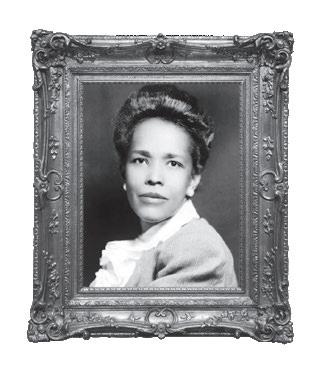
By Juliet Liu
Among the many individuals who played a role in the civil rights movement of the mid-twentieth century, Ella Baker stands out as a unique representation of leadership. People like Dr. Martin Luther King Jr. and Malcolm X may be the first names coming to mind when discussing the movement, but Baker’s service was no less profound, even though her name is not well-known. Ella Baker shows the meaning of Christlike leadership—not seeking to be a charismatic person in the spotlight but accepting the role of a quiet servant, one who raises others up. She demonstrates that true leadership is rooted in giving and empowering others.
Born on December 13, 1903, in the state of Virginia, Ella Baker grew up in a family that valued education and community activism. Her grandmother was born into slavery, and her parents instilled in her a strong sense of justice and the importance of standing up against inequality. After Baker’s grandparents gained their freedom, they purchased a small parcel of land that they were able to farm. Neighbors in need often knocked on the door, and young Ella noticed that no one was turned away without something to eat.
Baker attended the New York College for Teachers (now the City University of New York) and graduated in 1927. Her education provided her with academic knowledge and a grounding in social justice. After college, she began a career as a teacher. Soon her passion for activism took center stage in her professional and personal life. This activism was rooted in the stories her grandmother told, about

what it was like to grow up enslaved. Ella had also witnessed the generous community her grandparents provided throughout her childhood.
"Strong people don't need
Activism and the NAACP
Baker demonstrated her commitment to civil rights in the 1930s when she began working with the National Association for the Advancement of Colored People (NAACP). Beginning as a volunteer, her hard work and determination quickly advanced her to several leadership roles. Throughout the 1940s, Baker acted as the organization’s first field secretary. She traveled across the South, advocating for voter registration, organizing grassroots campaigns, and responding to lynchings and segregation.
Baker believed in the power of ordinary people to effect change, and her role only made her more certain. This belief would shape her approach to leadership throughout her life, as she began to witness that real power lies in collective action, not in the visibility of individuals.
SCLC and the Importance of Collective Action
In 1957, Baker founded the Southern Christian Leadership Conference (SCLC) alongside Dr. Martin Luther King Jr. and other prominent

Black Christian figures. As she worked with Dr. King, Baker began to see her vision of leadership diverge from many male counterparts in the SCLC. Several of these men emphasized a centralized, charismatic leadership model: they believed only strong leadership would drive the civil rights movement forward. But Baker advocated for the opposite—a more decentralized, democratic approach to organization. She believed that leadership should not just arise from public speakers in the limelight but from ordinary members of the community. For Baker, it was essential to nurture the skills and voices of those who might otherwise remain unheard.
Baker’s commitment to empowering others became especially evident in her approach to youth activism. She understood the necessity to engage young people in the civil rights movement and recognized their capacity to drive change. This commitment culminated in her involvement with the Student Nonviolent Coordinating Committee (SNCC), which she helped to organize in 1960. While the SCLC and the NAACP had always made efforts to convince young activists to join their existing organizational structure, Baker feared that young students would not be taken seriously or allowed to contribute in their own unique ways. Baker encouraged the college students to create their own movement instead. Through SNCC, Baker inspired a generation of young men and women to an active rather than passive role in the struggle for civil rights.
Behind closed doors, Baker was known to challenge Dr. King for his comfort in the spotlight. She argued that, if people were tempted to worship and follow him as an extraordinary hero figure, this would not be good for the movement in the long run. An emphasis on Dr. King and other charismatic leaders might cause ordinary citizens to question their own ability to make meaningful contributions. Baker challenged Dr. King to step out of the spotlight and to raise up leaders alongside him, but this request created friction between the pair. Ella Baker did not back down, and she continued to grow the movement in her own ways.
One of her most significant contributions was her belief in the power of collective decision-making. Baker famously stated, “Strong people don’t need strong leaders.” This philosophy emphasizes
the importance of empowering individuals to take ownership of their activism. It is all too easy to tell ourselves, Someone else can be the one to do it. Baker encouraged others to think critically and to take action; she fostered a sense of agency among those she mentored.
Defined by humility and a focus on service rather than personal acclaim, Baker’s leadership style was both distinctive and effective. As she worked behind the scenes, provided support and guidance to others—while deliberately avoiding the spotlight for herself—Baker modeled a different path for future leaders. Her mentorship extended beyond mere guidance; she invested in the growth, contributions, and success of all those around her. Many activists who worked with Baker, figures like John Lewis and Diane Nash, credit her with shaping their understanding of leadership and activism.
Ella Baker’s life reminds others of the leadership style of Jesus, who told His disciples that anyone wishing to be a leader must first be a servant of others (Mark 10:43–45). She embodied this principle, demonstrating that true leadership is not about seeking power or recognition but about lifting others up and serving the community. Despite her significant contributions, Baker’s name is often overlooked in narratives of the civil rights movement, even though she had a role in three organizations: the NAACP, SCLC, and SNCC. This oversight shows that society still tends to celebrate charismatic leadership, while neglecting the quiet, behind-the-scenes work that is just as impactful— if not more so.
But Baker’s legacy lives on and continues to influence activists and leaders today, especially those who value collaboration and community engagement. In a world that values charisma and personal glory, Baker’s example says, Think again. She teaches that effective leaders emerge from the community, driven by a passion for justice and a commitment to the good of others. In our churches and communities, let us cultivate an environment where every voice is heard and valued, echoing Baker’s belief that strong people act, even in the absence of strong leaders. When we embrace servant leadership, we foster a culture of collaboration, empathy, and empowerment, ensuring that the legacy of Ella Baker lives on.
The Adult Teacher Commentary and Adult Resources are packaged together for your convenience. Use the reproducible worksheets, additional discussion starters, and full-color Bible background posters to fully engage participants in each lesson.
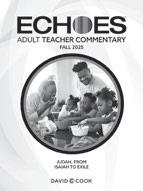

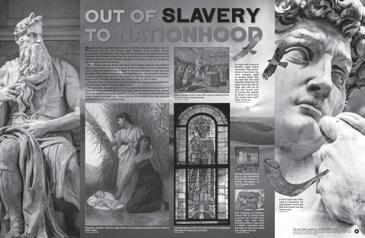
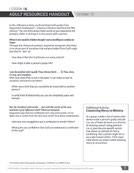
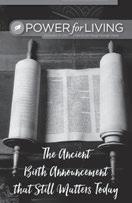



This weekly, magazine-style handout features articles on unique ministries, world missions, spiritual trends, and Christians serving the Lord throughout the world. The issues also include daily Bible readings, puzzles, poems, and book excerpts. Power for Living connects God’s truth to real life and can also be used as an outreach tool in prisons, in doctors’ offices, and as part of a ministry to homebound members of the church community.

This FREE online resource combines current news stories with your weekly Bible lessons. Each week you will find an alternative introductory activity featuring a news story and discussion questions that relate to the lesson. Also online are links to additional Bible commentary, worship playlists that relate to the focus of the lesson, and additional resources to help you prepare for and teach your lesson. Explore it today at RealLifeDownloaded.com

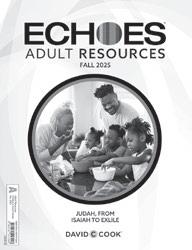

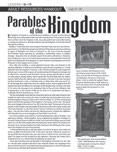


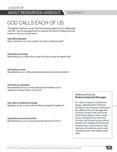

This addition to your teaching has been created to enhance the experience of the quarter with more visual aids and supplementary handouts for the class. Many of the larger themes and big ideas come together in these components, and the handouts give your students something else to take with them.
3 full-color posters to enrich your teaching
2 reproducible sheets that enhance the posters and feature a quarterly topic
12 reproducible handouts that support the lesson with an activity and/or discussion prompts

When you use these daily devotions, you’ll read through the recommended passage of Scripture, consider how fellow believers have applied the passage’s theme to daily life, and be encouraged to step into daily living with God in your life. Reflecting on the Bible each day invites us to a deeper fellowship with Christ as we apply God’s Word to our lives. This devotional aligns with the ISSL (International Sunday School Lessons) Home Daily Bible Readings listed each week in the Adult Teacher’s Commentary and Adult Student Guide.


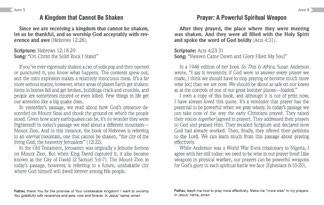

October is Pastor Appreciation Month, but it’s worth taking the time to encourage your pastor any month of the year
• Handwritten Letter or Card
One of the best ways to show that you care about them is to simply drop them a handwritten note of gratitude and thanks, perhaps highlighting something they have said or done that impacted you.
• Fill a Box or Jar of Memories
Find a group of people within the church and have each person write a positive, uplifting memory on a piece of paper. Collect all those memories in a decorated box or jar. Your pastor will be able to draw from that encouragement little by little, when needed.
• Organize a Calendar of Encouragement
Pastors need to be appreciated all year long. Find people to sign up for a specific month of the year to send a card or a small token of appreciation to the pastor. Don’t forget to remind people of what month they signed up for.
• Start a Pastor’s Prayer Group
Pastors need prayer. Start a small group of people that will commit to praying for the pastor regularly throughout the day or week. Let the pastor know that specific people are praying regularly.
• Honor Your Pastor’s Spouse (if applicable)
If your pastor is married, there is no greater way of showing appreciation to them than appreciating their spouse. Any of the above suggestions work equally well.
Prepare your heart and pause before you teach this lesson I come from a family of gossipers. On Sunday afternoons, my immediate family roasted the deacons, choir members, Sunday school teachers, and the people in the pew. We made jokes about how people dressed, how they talked, and who they brought to church. Talking about people from church, in the community, and around the world was what we did for fun at family gatherings. I admit, I participated for a long time into adulthood.
I will never forget one holiday in particular. I had finished eating, and the gossip started to flow. I opened my mouth and join in, but the Holy Spirit constrained me. I heard the Spirit quietly saying, “This is wrong.” I felt uncomfortable sitting at the table. So I scooped up a baby and said, “I’m going to put her down for a nap.” I stayed with the baby a long time because I didn't want to return and be questioned about my silence. I no longer felt comfortable making fun of people. A few years later, I did speak up at a family dinner: “Maybe we should find something else to do besides talking about people.” I got put down and called a Miss Goody Two-Shoes. I’m sure whenever I left the room I became the next subject of scorn. I felt awkward and rejected by my own family.
Early in my Christian life, I looked down at those I thought were not following biblical principles. But as I grew older, I realized my own shortcomings and failings. Now when I hear things that are out of order, I ask the Holy Spirit if I should say something. Family fun and traditions are one thing, but following the Lord’s leading is more important. That’s what your class needs to hear!
Find alternative lesson introduction, Spotify® playlists, and links to more teaching resources

On Echoes Worship Weekly, listen to “Hold to God’s Unchanging Hand” by Anchor Hymns, Sandra McCracken, and Chaunda Jefferson. This song is all about trusting God and following His ways. On Traditional Worship Weekly, listen to “I Have Decided to Follow Jesus” played by Jadon Lavik.
LESSON FOCUS:
Be faithful to God’s ways, even more than human traditions.
LESSON SCRIPTURE: Jeremiah 35:5–11
1 Start the Conversation
Share about important family traditions.
2 Study Today’s Scripture
Jeremiah uses a family’s traditions as an example of faithfulness.
3 Apply the Message
Traditions are one way that we demonstrate faithfulness.
Suggested Materials:
Ɏ Adult Resources: Reproducible Handout—“Tradition and Truth”
4 Live It Out
Be intentional about the good that can come from your traditions.

For more commentary, see p. 1250 in Wiersbe Bible Commentary: Old Testament.

As we have been learning about the prophets, we have seen that their job of communication is not easy. This week provides a concrete example of something that Jeremiah does as a demonstration, something to show what faithfulness means. God uses Jeremiah to try to get through to the people of Judah, even when they are not listening. “Living Parables: The Life of Prophets” and its associated handout give more examples.
Share about important family traditions.
student guide
LESSON 07 page 45
“It’s going to be big fun, mate. We do it every year,” explained Ambrose. “We get hammered and make a whole night of it.”
“Don’t you chaps do the same thing in America?” chimed Robert. They were in Antonne’s dorm at the University of West London. It was his second year at the university. It had been difficult to settle into a new country and new school, while making a new group of friends. But Antonne found his English classmates to be friendly toward Americans, possibly more so to Black students. Ambrose and Robert had promised him a “rip-roaring, good time” for Halloween. The plan was to hook up with a larger group and to get “totally sloshed.”
“I’m telling you, mate, you’re not going to want to miss this. And Felicity will be there,” added Robert.
Antonne kept thinking of what his extended family was doing back home: celebrating at a local farm with pumpkins, a corn maze, and all the trappings. Later they would build a campfire, drink cider, and huddle under blankets to sing or to listen to stories from his grandfather. It wasn’t the typical way to spend Halloween, but it had more meaning than what other folks did.
“You know,” Antonne said, sitting down and reaching for his phone, “I think tonight I might hang back and connect with my family. I haven’t called my grandfather in ages.”
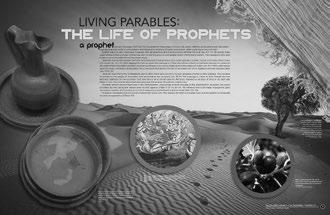
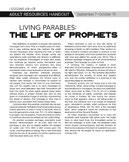

1 What is one of your favorite family traditions?
Many of us grow up celebrating important milestones and holidays with some kind of specific tradition. You may notice that many traditions are associated with meal times. That is no coincidence, since meals are an important community event.
2 What value did that tradition teach you?
Traditions can teach us to value certain things: diligence, patience, or quality time. Some traditions don’t have an obvious purpose, but they still form us into a closer community (a group that does something together).
3 What kind of good tradition do you want to start with your friends and family?
We probably don’t put enough thought into the formation of new traditions. Traditions can help us see the passage of time as we witness that some things change, while some never do. We should create God-honoring traditions to share with family.

Jeremiah 35:5–7
Jeremiah uses a family’s traditions as an example of faithfulness.
Jeremiah 35 takes place during the reign of King Jehoiakim, most likely around 605 BC, before Jeremiah is barred from entering the temple (Jer. 36:5). He has spent several years calling the people to turn back to God, often by unorthodox means: hiding and ruining a new garment (Jer. 13:1–11), smashing a clay jar as an example of God’s destructive power (Jer. 19:10–11), even wearing a yoke (Jer. 27:2; 28:10–11). Here Jeremiah uses a peculiar example—in fact, a peculiar people—to get his message across.
Read Jeremiah 35:5–7, and note the following:
• Jeremiah has invited a family called the Rekabites to join him in a room of the temple.
• Once there, Jeremiah places bowls of wine before them and invites them to drink.
• Instead, the Rekabites explain that this would violate their family’s traditions, which prohibit living in houses, farming crops, and drinking wine.
• They have kept these traditions in the hope that they shall remain in the land.
The ancestry of the Rekabites dates back to the Kenites, a nomadic tribe that included Moses’ father-in-law, Jethro. According to 1 Chronicles 2:55, a Kenite named Hammath preceded Jehonadab as a “father of the Rekabites.” Once the Israelites came into the promised land, the Kenites settled “among the inhabitants of the Desert of Judah in the Negev near Arad” (Judg. 1:16), which is near the border of modern-day Jordan.
The Rekabites appear to have retained their nomadic lifestyle. Over the following centuries, they moved throughout the land of inheritance. They were probably in the northern kingdom of Israel at the time they had taken their original vows and may have migrated south toward Judah after the fall of Israel in 722 BC.
5 And I set before the sons of the house of the Rechabites pots full of wine, and cups, and I said unto them, Drink ye wine.
6 But they said, We will drink no wine: for Jonadab the son of Rechab our father commanded us, saying, Ye shall drink no wine, neither ye, nor your sons for ever: 7 Neither shall ye build house, nor sow seed, nor plant vineyard, nor have any: but all your days ye shall dwell in tents; that ye may live many days in the land where ye be strangers.
The setting is the middle of Jeremiah’s prophetic ministry. At least some of the worst outcomes have already begun. But there is yet time to save lives and to make the people understand that turning to God’s mercy is their only hope. The faithless king of Judah, Jehoiakim, has not led the people into sincere repentance. Judah has been forced to submit to the invading powers of Babylon (1 Kings 24:1). Amidst all the coming and going from the city of Jerusalem, God sends Jeremiah to one family: the Rekabites, descendants of their ancestor, Rekab. God has a planned demonstration in mind.
Jeremiah brings the clan into the temple and arranges a test. He sets bowls of wine before the family and tells them to drink (Jer. 35:5). But there is something to know about the Rekabites: unlike most other families of this time, they have certain unique traditions. They do not drink wine, do not farm, and they live in tents (vv. 6–7).
Through his actions, Jeremiah is tempting this group to violate long-held family traditions. Before them is a prophet of God who has invited them to enter the temple and has made an offer of wine (presumably, before observers). But Jeremiah anticipates their response. Jeremiah (more importantly, God) already knows what the Rekabites will do.
The family comes at Jeremiah’s invitation, but they flatly decline to drink any wine set before

Jeremiah 35:5–7
5 Then I set bowls full of wine and some cups before the Rekabites and said to them, “Drink some wine.”
6 But they replied, “We do not drink wine, because our forefather Jehonadab son of Rekab gave us this command: ‘Neither you nor your descendants must ever drink wine. 7 Also you must never build houses, sow seed or plant vineyards; you must never have any of these things, but must always live in tents. Then you will live a long time in the land where you are nomads.’”
page 46
them. They explain their traditions, perhaps thinking this might be a simple misunderstanding: “Our forefather Jehonadab, son of Rekab gave us this command: ‘Neither you nor your descendants must ever drink wine’” (v. 6). The family members have probably kept this vow for more than two centuries, and they are not about to violate it now.
We may wonder why the Rekabites have this tradition in the first place. Unfortunately, the rest of Scripture is mostly silent about them; Jeremiah 35 is the only chapter that describes their history. More than likely, the reason their ancestor had forbidden the drinking of wine or the cultivation of crops was to free his descendants from being settled in one territory. The Rekabites are probably a clan of permanent nomads, expected to live like nomads, and a love for wine would make that lifestyle impossible.
Jehonadab—the ancestor who came up with these traditions—promised his family that, if they keep these traditions, they will “live a long time in the land where [they] are nomads” (v. 7). This promise closely resembles the wording of Israel’s covenant: “Observe therefore all the commands I [God] am giving you . . . so that you may live long in the land” (Deut. 11:8–9). And here is the crux of Jeremiah’s demonstration. Before the observers, Jeremiah highlights a family who upholds their traditions to ensure a righteous outcome.
1 What does Jeremiah the prophet ask the Rekabites to do? Why?
Jeremiah invites the family to come to the temple, where he sets before them bowls of wine and invites them to drink. This is an elaborate setup and test that will make an important demonstration. Jeremiah anticipates that his offer will be rejected.
2 How do the Rekabites respond? Why?
The Rekabites come and patiently explain their traditions before Jeremiah and observers. They have been faithful to what their ancestor asked of them, and they will not make this the day that they drink wine. Keeping their traditions has been part of their identity as nomads, for centuries.
3 What makes the Rekabites want to keep their traditions?
The promise of their ancestor was that these traditions would sustain his clan and would make their way of life possible. The Rekabites remember his promise: they shall retain the ability to live on their land if they abide by the traditions. Thus they avoid farming, drinking wine, and living in houses instead of tents.
Jehonadab lived in the ninth century BC, during the reign of King Jehu of Israel. Second Kings 10:15–31 tells that Jehonadab meets with Jehu (about 842 BC), and agrees to help Jehu eliminate the house of King Ahab and the Baal worship established by Ahab’s house. Verses 23–28 describe how Jehu and Jehonadab brought all Baal’s servants into the temple of Baal; after making sure “that no one who serves the Lord is here with you—only servants of Baal” (v. 23), Jehu sends his guards and officers in to kill Baal’s servants, then has them destroy the temple of Baal itself. At their first meeting, Jehu recruits Jehonadab because of their mutual “zeal for the Lord” (v. 16). That same zeal remains evident in Jehonadab’s followers more than two hundred years later. The Rekabites’ reputation precedes them by the time they meet Jeremiah in the temple.

Read Jeremiah 35:8–11, and note the following:
• The Rekabites continue to explain that they have come to the city of Jerusalem to seek refuge from the wars and conflicts in the land.
• They have not violated their traditions in any way.
• This demonstration of faithfulness stands in stark contrast to the rest of Judah, who has not obeyed the covenant with God.
During the temperance movements of the early twentieth century, the Rekabites’ refusal to drink wine was cited as an example for all believers to follow. Then and now, it is important to recognize and honor their faithfulness without missing the bigger point of obedience to God in all things. The Rekabites’ nomadic lifestyle prohibited them from planting vineyards, and avoiding wine was only one part of their vows.
Still, the Bible prohibits drunkenness and has many examples of its harms (Gen. 9:20–25; 19:30–38; Lev. 10:1–2, 8; Gal. 5:21; Eph. 5:18). Yet Jesus’ first miracle was turning water into wine at the wedding at Cana (John 2:1–11). Thus the apostle Paul’s advice probably sums it up best: “whether you eat or drink . . . do it all for the glory of God” (1 Cor. 10:31).
At the likely time of this passage (605–604 BC), King Nebuchadnezzar of Babylon had already begun raiding the regions around Judah, including Syria, Lebanon, and Israel, thus driving the Rekabites from the lands they had previously settled. Second Kings 24:1 also informs us that Nebuchadnezzar had begun raiding the outer regions of the southern kingdom of Judah, and eventually besieged Jerusalem itself: “Jehoiakim became his vassal for three years. But then he turned against Nebuchadnezzar and rebelled [in 601 BC].” Jehoiakim would join forces with the Egyptians and would eventually be removed by Nebuchadnezzar in 598 BC, carried off to Babylon.
Another immediate effect of Nebuchadnezzar’s initial raids was that, in submitting to Babylon, Jehoiakim had sent “some of the Israelites from the royal family and the nobility” to Babylon—including the prophet Daniel and his friends (Dan. 1:3, 6–7).
Jeremiah 35:8–11
8 Thus have we obeyed the voice of Jonadab the son of Rechab our father in all that he hath charged us, to drink no wine all our days, we, our wives, our sons, nor our daughters; 9 Nor to build houses for us to dwell in: neither have we vineyard, nor field, nor seed: 10 But we have dwelt in tents, and have obeyed, and done according to all that Jonadab our father commanded us. 11 But it came to pass, when Nebuchadnezzar king of Babylon came up into the land, that we said, Come, and let us go to Jerusalem for fear of the army of the Chaldeans, and for fear of the army of the Syrians: so we dwell at Jerusalem.
The Rekabites and their leader, Jaazaniah, continue to explain these vows and their refusal to drink wine. After their forefather forbid them to drink wine, build houses, or farm, they “obeyed everything [he] commanded” (v. 8). Because they all followed these commands to live as nomads, they “have lived in tents and have fully obeyed” (v. 10). Their long-standing zeal toward keeping ancestral traditions overcame any temptation to seek the comfort of permanent homes, much less a temptation to drink the wine Jeremiah has set before them.
The only reason the Rekabites have come to Jerusalem is to find safety from invading armies (v. 11). As a result of their nomadic lifestyle, they were able to flee to the city in a time of crisis. Nebuchadnezzar, the king of Babylon, had begun invading the lands of Judah and the eastern Mediterranean. Because of these wars to the north, the Rekabites arrived as refugees to Judah and found safety in the city of Jerusalem (v. 11). Even now, they are not in violation of their vows and traditions. Even now they are still living in tents.
Following the printed text, God tells Jeremiah to speak to the gathered people. Jeremiah recaps the test of the Rekabites and their faithful response (vv. 12–16). Then he brings
8 We have obeyed everything our forefather Jehonadab son of Rekab commanded us. Neither we nor our wives nor our sons and daughters have ever drunk wine 9 or built houses to live in or had vineyards, fields or crops. 10 We have lived in tents and have fully obeyed everything our forefather Jehonadab commanded us. 11 But when Nebuchadnezzar king of Babylon invaded this land, we said, ‘Come, we must go to Jerusalem to escape the Babylonian and Aramean armies.’ So we have remained in Jerusalem.”

page 48
the demonstration to a theological point: the Rekabites have done everything their ancestors had asked, have remained faithful, generation after generation. Conversely, during the same time, the people of Judah have proved utterly faithless to the covenant with God. God has sent many prophets (Jeremiah included) to urge Judah to turn from sin and idolatry. “But,” God concludes, “you have not paid attention or listened to me” (v. 15). Thus, the Rekabites are an illustration of the kind of faithfulness that Judah has struggled to display.
Therefore, because of this faithless behavior, God shall bring about “every disaster [God] pronounced against [Judah and Jerusalem]” (v. 17). God has provided ample opportunity to return to covenant obedience, but the door is quickly shutting.
On the other hand, the faithfulness of the Rekabites has not gone unnoticed before God. This opens a path for God to reward them. The point is not that the traditions of the Rekabites should be adopted by the other residents of Judah. But in recognition for their having kept ancestral traditions, God says, “Jehonadab son of Rekab will never fail to have a descendant to serve me” (v. 19). In the midst of a faithless generation, God finds cause to reward a family who chooses a different path.
1 How have the Rekabites demonstrated obedience to their ancestors after relocating to Jerusalem?
Because they were used to a nomadic lifestyle, the Rekabites were able to flee to Jerusalem. Once there, they continued to live in tents within the walls of the city. They are keeping their traditions during a time of uncertainty and when others would have made a change.
2 Why does God want to highlight an example of extravagant faithfulness?
God is not saying that the traditions of this family should be adopted universally. But God is on the hunt for faithfulness, because Judah has proven habitually unfaithful. Through Jeremiah, God demonstrates that people are finding it easier to keep human traditions than to keep the covenant.
3 How does God reward the Rekabites?
God says that there shall always be a descendant of this family in His service. It means that the Rekabites will, at least in part, escape the destruction that is to come. Their family will survive and continue.
There are many other instances in the Bible where God “tests” an individual or group—including cases when He fully anticipates a positive result. Abraham’s near sacrifice of Isaac—when God had already provided the real sacrifice (Gen. 22:8, 13–14)—is probably the best-known example. It allows Abraham to demonstrate obedient faith. Another example appears in Mark 7. As Jesus travels to the region of Tyre, He encounters a Gentile woman who pleads with Him to cast a demon from her daughter. Jesus’ initial response seems unusually blunt, if not rude: “it is not right to take the children’s bread and toss it to the dogs” (v. 27). In response, however, the woman’s words are humble and faith-filled: “Lord . . . even the dogs under the table eat the children’s crumbs” (v. 28). Jesus immediately tells the woman that her daughter has been healed as a result of her faith (vv. 29–30). Like the test of Jeremiah 35, Jesus allows her to demonstrate her faith, which serves as an example to the observers—and to us.

Traditions are one way that we demonstrate faithfulness.
This devotion and conclusion encourages each of us to pursue faithfulness to those things that God requires. Like the Rekabite family, we can demonstrate what it means to be faithful.
1 What is an example of something you always want to finish?
Almost everyone is devoted to finishing certain types of things. Maybe we are great at finishing our projects, our responsibilities at work, or even our taxes. If we look at what we are good at finishing, it might reveal something about our priorities. For instance, perhaps we are careful not to embarrass ourselves before colleagues at work by leaving work undone.
2 How can our faithfulness in other areas of life be an example of faithfulness before God? Depending on where we find faithfulness easy or convenient, it can spur us to consider the same attitude toward our spiritual obligations. Perhaps we need to take more care to follow God’s instructions, or perhaps we need to invite the right mentors to help us find a path forward.
3 What does it look like to obey God and to finish well?
There are many examples of individuals who have left a legacy that persists: spiritual leaders who bring people to Christ, great minds who inquire after God, devoted missionaries who spend a lifetime in service, and more. Use this opportunity to praise and to speak well of any pillars of your faith community, those showing you the way.

This handout invites us to evaluate holiday traditions against the truths we find in Scripture. It gives instructions for an additional activity: a group discussion of instructions from God.
“We have to finish this game!”
When those words came from my son’s mouth, I knew he was right. I had always been a lover of boardgames, but this was the moment I knew he loved them too. We were seated on the carpet of our living room, cards and pieces scattered in every direction. The game had gone on so long that I was willing to pack it away. But one look at his face made me certain I didn’t want to disappoint him.
“You’re right. We finish things, don’t we?”
With perfect comedic timing, my wife leaned into the room while holding a laundry basket. She said, “You finish the things you want to finish!”
It became a family joke that turned into a larger conversation. Each of us was able to think of projects and tasks that went unfinished: clothes tossed to the floor, a recycling bin that overflowed, schoolwork marked “Incomplete.” Thus, a new family motto was born: In this family, we finish things.
In the days of Jeremiah, God was seeking faithfulness, or what we might call the skill of finishing well. But the people of Judah were rebellious and uncommitted. Soon their lack of fortitude would reach its natural conclusion: God would send them into exile.
We can be grateful that God notices and rewards individual faithfulness. More than that, God is devoted to His plans and promises. If faithfulness is the art of finishing well, God is the master. He always brings His plans to fruition. In the person of Jesus, God has been faithful beyond the wildest imagination of human beings. We should be faithful because God is faithful.
As we have studied the traditions of one ancient family, perhaps you have noticed ways that your own family traditions could point others to God. Since we serve a God who is faithful, we can look for ways to exemplify faithfulness ourselves.
With a partner, discuss a family tradition that this lesson has encouraged you to start or continue. How do you hope that your family traditions can point others to God?
Be intentional about the good that can come from your traditions.
This lesson and the discussion of family traditions can prompt several responses. Perhaps some of your group will be proud to share about their family’s existing traditions, but others will want to use this opportunity to plan a new beginning. While there can be great joy in following traditions, we should ask ourselves whether we are using every opportunity to point the world to our heavenly Father.
Father in heaven, You are faithful; we struggle to be faithful. We confess that we may sometimes take ourselves and our traditions more seriously than our obedience to Your ways. Please help us to send the right message in all we do. Challenge us to finish well, in whatever lies before us. We are grateful for Your gift of redemption and that You continue to shape us into Jesus’ image. We pray in His name. Amen.

Key Text
For unto this day they drink none, but obey their father’s commandment:
—Jeremiah 35:14b KJV
To this day they do not drink wine, because they obey their forefather’s command.
—Jeremiah 35:14b NIV
Week of October 20 through October 25
Mon. Joel 2:28–32—A New Salvation. Tue. Ezekiel 36:25–35—A New Heart.
Wed. Deuteronomy 10:12–21—The Law’s Essence.
Thu. 2 Corinthians 3:1–6—A New Covenant.
Fri. 2 Corinthians 3:7–11—A New Spirit. Sat. Jeremiah 31:27–34—A New Relationship with God.
Next Week: Jeremiah 31:29–34; John 1:17 Next week we will be looking at God’s promise to make His people faithful and to give a new covenant. What is an item in your life that you’ve updated recently?
®
As students are leaving, hand out copies of this week’s Power for Living®


With devotions that follow your Echoes weekly study plan, Quiet Hour provides students focused direction for daily reflection. Correlated to each Bible lesson, the daily reading includes the Home Daily Reading Plan, explores how a fellow believer has applied its theme to their life, and ends with a prayer or devotion.
Encourage your class with Quiet Hour.
Available from David C Cook or your Christian retailer


Author Strahan Coleman offers readers guidance on how to have a transformative relationship with God. In Beholding, Coleman redefines prayer as a way of being with God, emphasizing its role in deepening our connection and enriching our spiritual lives. Thirsting explores our deep yearning for God, guiding us to embrace this spiritual thirst and experience a profound, intimate communion with God.





Designed for use with Adult Teacher Commentary and Student Guide
1-7
1
Poster and Reproducible Sheet—“Living Parables: The Life of Prophets”
Reproducible Sheet—“God Calls Each of Us.”
2 Reproducible Sheet—“A Time for Community”
2-3
Poster—“Thy word” (Ps. 119:105)
3 Reproducible Sheet—“Finding Real Treasure”
5 Reproducible Sheet—“God’s Mirror, My Mirror”
6 Reproducible Sheet—“Confessions”
7 Reproducible Sheet—“Tradition and Truth”
8 Reproducible Sheet—“Prayer as Covenant”
8-13
Poster and Reproducible Sheet—“Leaves for Healing”
9 Reproducible Sheet—“Our Rescuer”
10 Reproducible Sheet—“Praying for Leaders”
11 Reproducible Sheet—“Deliverance from Self”
12 Reproducible Sheet—“Traits of a Watcher”
13 Reproducible Sheet—“Water is Life-Giving”
Adult Resources is published quarterly by David C Cook, DavidCCook.org. © 2025 by David C Cook, 4050 Lee Vance Drive, Colorado Springs, CO 80918, U.S.A. Echoes® and David C Cook and its related logo are registered trademarks of David C Cook. All rights reserved. ISBN 978-0-781-44792-8 Printed in South Korea. All Scripture quotations, unless otherwise indicated, are taken from the Holy Bible, New International Version®, NIV® Copyright © 1973, 1978, 1984, 2011 by Biblica, Inc.® Used by permission. All rights reserved worldwide. Scripture quotations marked (KJV) are taken from the King James Version. Lessons and/or Readings are based on the Uniform Series International Sunday School Lessons International Bible Lessons for Christian Teaching copyright © 2022 National Council of the Churches of Christ in the USA. Used by permission. All rights reserved. Digital products are subject to the End User License Agreement (EULA) found at DavidCCook.org/EULA/ and any additional terms or restrictions that may accompany the product. Digital products cannot be returned, sold, or relicensed. This product license is good for 6 months. After 6 months, you must purchase another license.
Cover Photo: © MoMo Productions/Getty Images Vol. 38, No. 1.
Read the family activities in the tic-tac-toe grid. If the activity is a family tradition, draw an “x” over it. If the activity aligns to a particular biblical truth, draw an “o” over it. If both apply, draw a “star” over it. If you compare with a neighbor, you might find that you each have different ways of thinking about these.
Family meals
Family shopping for Christmas tree
Family reading the Bible
Family thanking God before eating
Family sharing Jesus with neighbors
Family Christmas gift exchange
Family worships together
Family vacations
Family cooking grandma’s favorite cookies
How do these and other kinds of family traditions connect us to God?
Additional Activity: Group Discussion of Following God’s Ways
Separate into groups of 2–3 people. Each person should come up with an instruction from God, something that could be overlooked or missed. This could be specific, like praying for missionaries, or more general, like practicing gentleness. Feel free to discuss why this instruction can or has been historically overlooked, and talk about plans to fulfill this obligation. Once every group member has shared, discuss the possible consequences of ignoring commands from God. End by sharing with the larger group some of your ideas.



Adult Student Guide is published quarterly by David C Cook, DavidCCook.org. © 2025 by David C Cook, 4050 Lee Vance Drive, Colorado Springs, CO 80918, U.S.A. Echoes® and David C Cook and its related logo are registered trademarks of David C Cook. All rights reserved. ISBN 978-0-781-44615-0. Large Print ISBN 978-0-781-44793-5. Printed in South Korea. All Scripture quotations, unless otherwise indicated, are taken from the Holy Bible, New International Version®, NIV® Copyright © 1973, 1978, 1984, 2011 by Biblica, Inc.® Used by permission. All rights reserved worldwide. Scripture quotations marked (KJV) are taken from the King James Version. Lessons and/or Readings are based on the Uniform Series International Sunday School Lessons International Bible Lessons for Christian Teaching copyright © 2022 National Council of the Churches of Christ in the USA. Used by permission. All rights reserved. Digital products are subject to the End User License Agreement (EULA) found at DavidCCook.org/EULA/ and any additional terms or restrictions that may accompany the product. Digital products cannot be returned, sold, or relicensed. This product license is good for 6 months. After 6 months, you must purchase another license. LEGO® is a trademark of the LEGO Group of companies. All rights reserved worldwide.
David C Cook would like to thank the following lesson contributors: Madison Cannon, Joel Clarkson, Lee D. Hoffer, Patricia Merritt, Tanae Murdic, Maralee Parker, Michael Rade, Ryan Rice Sr., Chad Ryan, Carl Simmons, Charlotte Snyder, Denise Snyder, Justine Tegen, Faith Waters, Randy E. Williams, Roslyn Yilpet
Editors Designer Production
Jason Hitchcock
Trinity Richards
Dale Johnson
Sean McCoy
Unit 1: Isaiah and the Renewal of the Temple

Unit 2: Jeremiah and the Promise of Renewal
Unit 3: Ezekiel and the Exile of Judah

God guided the people of Judah, and the same God helps and guides us today. The time of the prophets reminds us of our own context: people distracted, chasing after idols, and forgetting what God had done. Over the next few months, we will read about God’s way of reminding His people of His love and purpose, often through the sending of prophets. As we approach these stories, we find that they teach us about ourselves and our relationship with God.
In this quarter, here are some of the biblical principles that we will study and apply to situations in our lives:
God makes people His messengers. (Lesson 1)
God invites us to return to Him. (Lesson 2)
God uses Scripture to reform us. (Lesson 3)
God’s servant will face rejection and hostility. (Lesson 4)
God’s messengers might seem young and inexperienced. (Lesson 5)
God wants mercy even more than religious devotion. (Lesson 6)
Be faithful to God’s ways, even more than human traditions. (Lesson 7)
We need God to make us faithful. (Lesson 8)
God can rescue those who do the right thing. (Lesson 9)
Expect human leaders to disappoint you. (Lesson 10)
In our grief we need God. (Lesson 11)
God warns that wickedness leads to ruin. (Lesson 12)
God’s redemptive plan is firm and unshakable. (Lesson 13)

“It’s going to be big fun, mate. We do it every year,” explained Ambrose. “We get hammered and make a whole night of it.”
“Don’t you chaps do the same thing in America?” chimed Robert. They were in Antonne’s dorm at the University of West London. It was his second year at the university. It had been difficult to settle into a new country and new school, while making a new group of friends. But Antonne found his English classmates to be friendly toward Americans, possibly more so to Black students.
Ambrose and Robert had promised him a “rip-roaring, good time” for Halloween. The plan was to hook up with a larger group and to get “totally sloshed.”
“I’m telling you, mate, you’re not going to want to miss this. And Felicity will be there,” added Robert.
Antonne kept thinking of what his extended family was doing back home: celebrating at a local farm with pumpkins, a corn maze, and all the trappings. Later they would build a campfire, drink cider, and huddle under blankets to sing or to listen to stories from his grandfather. It wasn’t the typical way to spend Halloween, but it had more meaning than what other folks did.
“You know,” Antonne said, sitting down and reaching for his phone, “I think tonight I might hang back and connect with my family. I haven’t called my grandfather in ages.”
1 What is one of your favorite family traditions?
2 What value did that tradition teach you?
3 What kind of good tradition do you want to start with your friends and family?
Jeremiah 35:5–7
5 And I set before the sons of the house of the Rechabites pots full of wine, and cups, and I said unto them, Drink ye wine.
6 But they said, We will drink no wine: for Jonadab the son of Rechab our father commanded us, saying, Ye shall drink no wine, neither ye, nor your sons for ever: 7 Neither shall ye build house, nor sow seed, nor plant vineyard, nor have any: but all your days ye shall dwell in tents; that ye may live many days in the land where ye be strangers.

NIV Jeremiah 35:5–7
5 Then I set bowls full of wine and some cups before the Rekabites and said to them, “Drink some wine.”
6 But they replied, “We do not drink wine, because our forefather Jehonadab son of Rekab gave us this command: ‘Neither you nor your descendants must ever drink wine. 7 Also you must never build houses, sow seed or plant vineyards; you must never have any of these things, but must always live in tents. Then you will live a long time in the land where you are nomads.’
The setting is the middle of Jeremiah’s prophetic ministry. At least some of the worst outcomes have already begun. But there is yet time to save lives and to make the people understand that turning to God’s mercy is their only hope. The faithless king of Judah, Jehoiakim, has not led the people into sincere repentance. Judah has been forced to submit to the invading powers of Babylon (1 Kings 24:1). Amidst all the coming and going from the city of Jerusalem, God sends Jeremiah to one family: the Rekabites, descendants of their ancestor, Rekab. God has a planned demonstration in mind. Jeremiah brings the clan into the temple and arranges a test. He sets bowls of wine before the family and tells them to drink (Jer. 35:5). But there is something to know about the Rekabites: unlike most other families of this time, they have certain unique traditions. They do not drink wine, do not farm, and they live in tents (vv. 6–7). Through his actions, Jeremiah is tempting this group to violate longheld family traditions. Before them is a prophet of God who has invited them to enter the temple and has made an offer of wine (presumably, before observers). But Jeremiah anticipates their response. Jeremiah (more importantly, God) already knows what the Rekabites will do.
The family comes at Jeremiah’s invitation, but they flatly decline to drink any wine set before them. They explain their traditions, perhaps thinking this might be a simple misunderstanding: “Our forefather Jehonadab, son of Rekab gave us this command: ‘Neither you nor your descendants must ever drink wine’” (v. 6). The family members have probably kept this vow for more than two centuries, and they are not about to violate it now.
We may wonder why the Rekabites have this tradition in the first place. Unfortunately, the rest of Scripture is mostly silent about them; Jeremiah 35 is the only chapter that describes their history. More than likely, the reason their ancestor had forbidden the drinking of wine or the cultivation of crops was to free his descendants from being settled in one territory. The Rekabites are probably a clan of permanent nomads, expected to live like nomads, and a love for wine would make that lifestyle impossible.
Jehonadab—the ancestor who came up with these traditions— promised his family that, if they keep these traditions, they will “live a long time in the land where [they] are nomads” (v. 7). This promise closely resembles the wording of Israel’s covenant: “Observe therefore all the commands I [God] am giving you . . . so that you may live long in the land” (Deut. 11:8–9). And here is the crux of Jeremiah’s demonstration. Before the observers, Jeremiah highlights a family who upholds their traditions to ensure a righteous outcome.
1 What does Jeremiah the prophet ask the Rekabites to do? Why?

2 How do the Rekabites respond? Why?
3 What makes the Rekabites want to keep their traditions?
Jeremiah 35:8–11
8 Thus have we obeyed the voice of Jonadab the son of Rechab our father in all that he hath charged us, to drink no wine all our days, we, our wives, our sons, nor our daughters; 9 Nor to build houses for us to dwell in: neither have we vineyard, nor field, nor seed: 10 But we have dwelt in tents, and have obeyed, and done according to all that Jonadab our father commanded us. 11 But it came to pass, when Nebuchadrezzar king of Babylon came up into the land, that we said, Come, and let us go to Jerusalem for fear of the army of the Chaldeans, and for fear of the army of the Syrians: so we dwell at Jerusalem.

8 We have obeyed everything our forefather Jehonadab son of Rekab commanded us. Neither we nor our wives nor our sons and daughters have ever drunk wine 9 or built houses to live in or had vineyards, fields or crops. 10 We have lived in tents and have fully obeyed everything our forefather Jehonadab commanded us. 11 But when Nebuchadnezzar king of Babylon invaded this land, we said, ‘Come, we must go to Jerusalem to escape the Babylonian and Aramean armies.’ So we have remained in Jerusalem.”
The Rekabites and their leader, Jaazaniah, continue to explain these vows and their refusal to drink wine. After their forefather forbid them to drink wine, build houses, or farm, they “obeyed everything [he] commanded” (v. 8). Because they all followed these commands to live as nomads, they “have lived in tents and have fully obeyed” (v. 10). Their long-standing zeal toward keeping ancestral traditions overcame any temptation to seek the comfort of permanent homes, much less a temptation to drink the wine Jeremiah has set before them.
The only reason the Rekabites have come to Jerusalem is to find safety from invading armies (v. 11). As a result of their nomadic lifestyle, they were able to flee to the city in a time of crisis. Nebuchadnezzar, the king of Babylon, had begun invading the lands of Judah and the eastern Mediterranean. Because of these wars to the north, the Rekabites arrived as refugees to Judah and found safety in the city of Jerusalem (v. 11). Even now, they are not in violation of their vows and traditions. Even now they are still living in tents. Following the printed text, God tells Jeremiah to speak to the
gathered people. Jeremiah recaps the test of the Rekabites and their faithful response (vv. 12–16). Then he brings the demonstration to a theological point: the Rekabites have done everything their ancestors had asked, have remained faithful, generation after generation. Conversely, during the same time, the people of Judah have proved utterly faithless to the covenant with God. God has sent many prophets (Jeremiah included) to urge Judah to turn from sin and idolatry. “But,” God concludes, “you have not paid attention or listened to me” (v. 15). Thus, the Rekabites are an illustration of the kind of faithfulness that Judah has struggled to display.
Therefore, because of this faithless behavior, God shall bring about “every disaster [God] pronounced against [Judah and Jerusalem]” (v. 17). God has provided ample opportunity to return to covenant obedience, but the door is quickly shutting.
On the other hand, the faithfulness of the Rekabites has not gone unnoticed before God. This opens a path for God to reward them. The point is not that the traditions of the Rekabites should be adopted by the other residents of Judah. But in recognition for their having kept ancestral traditions, God says, “Jehonadab son of Rekab will never fail to have a descendant to serve me” (v. 19). In the midst of a faithless generation, God finds cause to reward a family who chooses a different path.
1 How have the Rekabites demonstrated obedience to their ancestors after relocating to Jerusalem?

2 Why does God want to highlight an example of extravagant faithfulness?
3 How does God reward the Rekabites?
“We have to finish this game!”
When those words came from my son’s mouth, I knew he was right. I had always been a lover of boardgames, but this was the moment I knew he loved them too. We were seated on the carpet of our living room, cards and pieces scattered in every direction. The game had gone on so long that I was willing to pack it away. But one look at his face made me certain I didn’t want to disappoint him.
“You’re right. We finish things, don’t we?”
With perfect comedic timing, my wife leaned into the room while holding a laundry basket. She said, “You finish the things you want to finish!”
It became a family joke that turned into a larger conversation. Each of us was able to think of projects and tasks that went unfinished: clothes tossed to the floor, a recycling bin that overflowed, schoolwork marked “Incomplete.” Thus, a new family motto was born: In this family, we finish things.
In the days of Jeremiah, God was seeking faithfulness, or what we might call the skill of finishing well. But the people of Judah were rebellious and uncommitted. Soon their lack of fortitude would reach its natural conclusion: God would send them into exile.
We can be grateful that God notices and rewards individual faithfulness. More than that, God is devoted to His plans and promises. If faithfulness is the art of finishing well, God is the master. He always brings His plans to fruition. In the person of Jesus, God has been faithful beyond the wildest imagination of human beings. We should be faithful because God is faithful.
1 What is an example of something you always want to finish?

2 How can our faithfulness in other areas of life be an example of faithfulness before God?
3 What does it look like to obey God and to finish well?
As we have studied the traditions of one ancient family, perhaps you have noticed ways that your own family traditions could point others to God. Since we serve a God who is faithful, we can look for ways to exemplify faithfulness ourselves.
With a partner, discuss a family tradition that this lesson has encouraged you to start or continue. How do you hope that your family traditions can point others to God?

Key Text
For unto this day they drink none, but obey their father’s commandment: —Jeremiah 35:14b KJV
To this day they do not drink wine, because they obey their forefather’s command. —Jeremiah 35:14b NIV
Quiet Hour® and Cross Daily Bible Readings
Week of October 20 through October 25
Mon. Joel 2:28–32—A New Salvation.
Tue. Ezekiel 36:25–35—A New Heart.
Wed. Deuteronomy 10:12–21—The Law’s Essence.
Thu. 2 Corinthians 3:1–6—A New Covenant.
Fri. 2 Corinthians 3:7–11—A New Spirit.
Sat. Jeremiah 31:27–34—A New Relationship with God.
Next Week: Jeremiah 31:29–34; John 1:17
Next week we will be looking at God’s promise to make His people faithful and to give a new covenant. What is an item in your life that you’ve updated recently?

Ezekielsays, “Fruit trees of all kinds will grow on both banks of the river. Their leaves will not wither, nor their fruit fail. . . . Their fruit will serve for food and their leaves for healing” (Ezek. 47:12).
To this day around the world, many kinds of trees shed leaves as they prepare for seasonal change. As days shorten, leaves lose their green color, revealing vibrant yellow, orange, and red. But what if those falling leaves didn’t decay and turn into compost? What if God were to redesign even the decaying leaves and repurpose them for healing?
That is part of Ezekiel’s vision of hope. Anyone who feels awestruck by the splendor of leaves passing away, God invites to rest in the hope that theses glories of creation shall be reshaped and remade, until all is well. God gives light to the darkness, new life to the lifeless.


Author Strahan Coleman offers readers guidance on how to have a transformative relationship with God. In Beholding, Coleman redefines prayer as a way of being with God, emphasizing its role in deepening our connection and enriching our spiritual lives. Thirsting explores our deep yearning for God, guiding us to embrace this spiritual thirst and experience a profound, intimate communion with God.




JUDAH, FROM ISAIAH TO EXILE

Adult Student Guide is published quarterly by David C Cook, DavidCCook.org. © 2025 by David C Cook, 4050 Lee Vance Drive, Colorado Springs, CO 80918, U.S.A. Echoes® and David C Cook and its related logo are registered trademarks of David C Cook. All rights reserved. ISBN 978-0-781-44615-0. Large Print ISBN 978-0-781-44793-5. Printed in South Korea. All Scripture quotations, unless otherwise indicated, are taken from the Holy Bible, New International Version®, NIV® Copyright © 1973, 1978, 1984, 2011 by Biblica, Inc.® Used by permission. All rights reserved worldwide. Scripture quotations marked (KJV) are taken from the King James Version. Lessons and/or Readings are based on the Uniform Series International Sunday School Lessons International Bible Lessons for Christian Teaching copyright © 2022 National Council of the Churches of Christ in the USA. Used by permission. All rights reserved. Digital products are subject to the End User License Agreement (EULA) found at DavidCCook.org/EULA/ and any additional terms or restrictions that may accompany the product. Digital products cannot be returned, sold, or relicensed. This product license is good for 6 months. After 6 months, you must purchase another license. LEGO® is a trademark of the LEGO Group of companies. All rights reserved worldwide.
David C Cook would like to thank the following lesson contributors: Madison Cannon, Joel Clarkson, Lee D. Hoffer, Patricia Merritt, Tanae Murdic, Maralee Parker, Michael Rade, Ryan Rice Sr., Chad Ryan, Carl Simmons, Charlotte Snyder, Denise Snyder, Justine Tegen, Faith Waters, Randy E. Williams, Roslyn Yilpet
Editors Designer Production
Jason Hitchcock
Trinity Richards
Dale Johnson
Sean McCoy
Vol. 39, No. 1
Unit 1: Isaiah and the Renewal of the Temple
Lesson 1 Sept 7
Isaiah’s Call and Ministry 3
Isaiah 6:1–8; 38:1–5
Lesson 2 Sept 14 Hezekiah’s Passover 10
2 Chronicles 30:1–9, 26–27
Lesson 3 Sept 21 Hilkiah’s Discovery 17
2 Chronicles 34:15–22, 26–27
Lesson 4 Sept 28 The Servant’s Suffering 24
Isaiah 53:1–7
Unit 2: Jeremiah and the Promise of Renewal
Lesson 5 Oct 5
Lesson 6 Oct 12

Jeremiah’s Call and Arrest 31
Jeremiah 1:6–10; 26:8–9, 12–15
Jeremiah’s Message 38
Jeremiah 7:1–11, 21–23
Lesson 7 Oct 19 A Family’s Example 45
Jeremiah 35:5–11
Lesson 8 Oct 26 Changes Promised 52
Lesson 9 Nov 2
Jeremiah 31:29–34; John 1:17
Jeremiah’s Rescue 59
Jeremiah 38:7–13
Unit 3: Ezekiel and the Exile of Judah
Lesson 10 Nov 9
Jerusalem’s Fall 66
2 Kings 24:18–25:9
Lesson 11 Nov 16 Ezekiel’s Sign 73
Ezekiel 3:10–11; 24:15–24, 27
Lesson 12 Nov 23 Ezekiel’s Responsibility 80
Ezekiel 33:7–16a
Lesson 13 Nov 30 Ezekiel’s Vision 87
Ezekiel 47:1–9, 12

God guided the people of Judah, and the same God helps and guides us today. The time of the prophets reminds us of our own context: people distracted, chasing a er idols, and forge ing what God had done. Over the next few months, we will read about God’s way of reminding His people of His love and purpose, o en through the sending of prophets. As we approach these stories, we find that they teach us about ourselves and our relationship with God.
In this quarter, here are some of the biblical principles that we will study and apply to situations in our lives:
God makes people His messengers. (Lesson 1)
God invites us to return to Him. (Lesson 2)
God uses Scripture to reform us. (Lesson 3)
God’s servant will face rejection and hostility. (Lesson 4)
God’s messengers might seem young and inexperienced. (Lesson 5)
God wants mercy even more than religious devotion. (Lesson 6)
Be faithful to God’s ways, even more than human traditions. (Lesson 7)
We need God to make us faithful. (Lesson 8)
God can rescue those who do the right thing. (Lesson 9)
Expect human leaders to disappoint you. (Lesson 10)
In our grief we need God. (Lesson 11)
God warns that wickedness leads to ruin. (Lesson 12)
God’s redemptive plan is firm and unshakable. (Lesson 13)

“It’s going to be big fun, mate. We do it every year,” explained Ambrose. “We get hammered and make a whole night of it.”
“Don’t you chaps do the same thing in America?” chimed Robert. They were in Antonne’s dorm at the University of West London. It was his second year at the university. It had been difficult to settle into a new country and new school, while making a new group of friends. But Antonne found his English classmates to be friendly toward Americans, possibly more so to Black students.
Ambrose and Robert had promised him a “rip-roaring, good time” for Halloween. The plan was to hook up with a larger group and to get “totally sloshed.”
“I’m telling you, mate, you’re not going to want to miss this. And Felicity will be there,” added Robert.
Antonne kept thinking of what his extended family was doing back home: celebrating at a local farm with pumpkins, a corn maze, and all the trappings. Later they would build a campfire, drink cider, and huddle under blankets to sing or to listen to stories from his grandfather. It wasn’t the typical way to spend Halloween, but it had more meaning than what other folks did.
“You know,” Antonne said, si ing down and reaching for his phone, “I think tonight I might hang back and connect with my family. I haven’t called my grandfather in ages.”
1 What is one of your favorite family traditions?
2 What value did that tradition teach you?
3 What kind of good tradition do you want to start with your friends and family?

5 And I set before the sons of the house of the Rechabites pots full of wine, and cups, and I said unto them, Drink ye wine.
6 But they said, We will drink no wine: for Jonadab the son of Rechab our father commanded us, saying, Ye shall drink no wine, neither ye, nor your sons for ever: 7 Neither shall ye build house, nor sow seed, nor plant vineyard, nor have any: but all your days ye shall dwell in tents; that ye may live many days in the land where ye be strangers.
The se ing is the middle of Jeremiah’s prophetic ministry. At least some of the worst outcomes have already begun. But there is yet time to save lives and to make the people understand that turning to God’s mercy is their only hope. The faithless king of Judah, Jehoiakim, has not led the people into sincere repentance. Judah has been forced to submit to the invading powers of Babylon (1 Kings 24:1). Amidst all the coming and going from the city of Jerusalem, God sends Jeremiah to one family: the Rekabites, descendants of their ancestor, Rekab. God has a planned demonstration in mind. Jeremiah brings the clan into the temple and arranges a test. He sets bowls of wine before the family and tells them to drink (Jer. 35:5). But there is something to know about the Rekabites: unlike most other families of this time, they have certain unique traditions. They do not drink wine, do not farm, and they live in tents (vv. 6–7). Through his actions, Jeremiah is tempting this group to violate longheld family traditions. Before them is a prophet of God who has invited them to enter the temple and has made an offer of wine (presumably, before observers). But Jeremiah anticipates their response. Jeremiah (more importantly, God) already knows what the Rekabites will do. Jeremiah 35:5–7
5 Then I set bowls full of wine and some cups before the Rekabites and said to them, “Drink some wine.”
6 But they replied, “We do not drink wine, because our forefather Jehonadab son of Rekab gave us this command: ‘Neither you nor your descendants must ever drink wine. 7 Also you must never build houses, sow seed or plant vineyards; you must never have any of these things, but must always live in tents. Then you will live a long time in the land where you are nomads.’
The family comes at Jeremiah’s invitation, but they flatly decline to drink any wine set before them. They explain their traditions, perhaps thinking this might be a simple misunderstanding: “Our forefather Jehonadab, son of Rekab gave us this command: ‘Neither you nor your descendants must ever drink wine’” (v. 6). The family members have probably kept this vow for more than two centuries, and they are not about to violate it now.
We may wonder why the Rekabites have this tradition in the first place. Unfortunately, the rest of Scripture is mostly silent about them; Jeremiah 35 is the only chapter that describes their history. More than likely, the reason their ancestor had forbidden the drinking of wine or the cultivation of crops was to free his descendants from being se led in one territory. The Rekabites are probably a clan of permanent nomads, expected to live like nomads, and a love for wine would make that lifestyle impossible.
Jehonadab—the ancestor who came up with these traditions— promised his family that, if they keep these traditions, they will “live a long time in the land where [they] are nomads” (v. 7). This promise closely resembles the wording of Israel’s covenant: “Observe therefore all the commands I [God] am giving you . . . so that you may live long in the land” (Deut. 11:8–9). And here is the crux of Jeremiah’s demonstration. Before the observers, Jeremiah highlights a family who upholds their traditions to ensure a righteous outcome.
1 What does Jeremiah the prophet ask the Rekabites to do? Why?

2 How do the Rekabites respond? Why?
3 What makes the Rekabites want to keep their traditions?
8 Thus have we obeyed the voice of Jonadab the son of Rechab our father in all that he hath charged us, to drink no wine all our days, we, our wives, our sons, nor our daughters; 9 Nor to build houses for us to dwell in: neither have we vineyard, nor field, nor seed: 10 But we have dwelt in tents, and have obeyed, and done according to all that Jonadab our father commanded us. 11 But it came to pass, when Nebuchadrezzar king of Babylon came up into the land, that we said, Come, and let us go to Jerusalem for fear of the army of the Chaldeans, and for fear of the army of the Syrians: so we dwell at Jerusalem.

8 We have obeyed everything our forefather Jehonadab son of Rekab commanded us. Neither we nor our wives nor our sons and daughters have ever drunk wine 9 or built houses to live in or had vineyards, fields or crops. 10 We have lived in tents and have fully obeyed everything our forefather Jehonadab commanded us. 11 But when Nebuchadnezzar king of Babylon invaded this land, we said, ‘Come, we must go to Jerusalem to escape the Babylonian and Aramean armies.’ So we have remained in Jerusalem.”
The Rekabites and their leader, Jaazaniah, continue to explain these vows and their refusal to drink wine. A er their forefather forbid them to drink wine, build houses, or farm, they “obeyed everything [he] commanded” (v. 8). Because they all followed these commands to live as nomads, they “have lived in tents and have fully obeyed” (v. 10). Their long-standing zeal toward keeping ancestral traditions overcame any temptation to seek the comfort of permanent homes, much less a temptation to drink the wine Jeremiah has set before them.
The only reason the Rekabites have come to Jerusalem is to find safety from invading armies (v. 11). As a result of their nomadic lifestyle, they were able to flee to the city in a time of crisis. Nebuchadnezzar, the king of Babylon, had begun invading the lands of Judah and the eastern Mediterranean. Because of these wars to the north, the Rekabites arrived as refugees to Judah and found safety in the city of Jerusalem (v. 11). Even now, they are not in violation of their vows and traditions. Even now they are still living in tents. Following the printed text, God tells Jeremiah to speak to the
gathered people. Jeremiah recaps the test of the Rekabites and their faithful response (vv. 12–16). Then he brings the demonstration to a theological point: the Rekabites have done everything their ancestors had asked, have remained faithful, generation a er generation. Conversely, during the same time, the people of Judah have proved u erly faithless to the covenant with God. God has sent many prophets (Jeremiah included) to urge Judah to turn from sin and idolatry. “But,” God concludes, “you have not paid a ention or listened to me” (v. 15). Thus, the Rekabites are an illustration of the kind of faithfulness that Judah has struggled to display.
Therefore, because of this faithless behavior, God shall bring about “every disaster [God] pronounced against [Judah and Jerusalem]” (v. 17). God has provided ample opportunity to return to covenant obedience, but the door is quickly shu ing.
On the other hand, the faithfulness of the Rekabites has not gone unnoticed before God. This opens a path for God to reward them. The point is not that the traditions of the Rekabites should be adopted by the other residents of Judah. But in recognition for their having kept ancestral traditions, God says, “Jehonadab son of Rekab will never fail to have a descendant to serve me” (v. 19). In the midst of a faithless generation, God finds cause to reward a family who chooses a different path.
1 How have the Rekabites demonstrated obedience to their ancestors a er relocating to Jerusalem?

2 Why does God want to highlight an example of extravagant faithfulness?
3 How does God reward the Rekabites?
“We have to finish this game!”
When those words came from my son’s mouth, I knew he was right. I had always been a lover of boardgames, but this was the moment I knew he loved them too. We were seated on the carpet of our living room, cards and pieces sca ered in every direction. The game had gone on so long that I was willing to pack it away. But one look at his face made me certain I didn’t want to disappoint him.
“You’re right. We finish things, don’t we?”
With perfect comedic timing, my wife leaned into the room while holding a laundry basket. She said, “You finish the things you want to finish!”
It became a family joke that turned into a larger conversation. Each of us was able to think of projects and tasks that went unfinished: clothes tossed to the floor, a recycling bin that overflowed, schoolwork marked “Incomplete.” Thus, a new family mo o was born: In this family, we finish things.
In the days of Jeremiah, God was seeking faithfulness, or what we might call the skill of finishing well. But the people of Judah were rebellious and uncommi ed. Soon their lack of fortitude would reach its natural conclusion: God would send them into exile.
We can be grateful that God notices and rewards individual faithfulness. More than that, God is devoted to His plans and promises. If faithfulness is the art of finishing well, God is the master. He always brings His plans to fruition. In the person of Jesus, God has been faithful beyond the wildest imagination of human beings. We should be faithful because God is faithful.
1 What is an example of something you always want to finish?

2 How can our faithfulness in other areas of life be an example of faithfulness before God?
3 What does it look like to obey God and to finish well?
As we have studied the traditions of one ancient family, perhaps you have noticed ways that your own family traditions could point others to God. Since we serve a God who is faithful, we can look for ways to exemplify faithfulness ourselves.
With a partner, discuss a family tradition that this lesson has encouraged you to start or continue. How do you hope that your family traditions can point others to God?

For unto this day they drink none, but obey their father’s commandment: —Jeremiah 35:14b KJV
To this day they do not drink wine, because they obey their forefather’s command. —Jeremiah 35:14b NIV
Quiet Hour® and Cross Daily Bible Readings
Week of October 20 through October 25
Mon. Joel 2:28–32—A New Salvation.
Tue. Ezekiel 36:25–35—A New Heart.
Wed. Deuteronomy 10:12–21—The Law’s Essence.
Thu. 2 Corinthians 3:1–6—A New Covenant.
Fri. 2 Corinthians 3:7–11—A New Spirit.
Sat. Jeremiah 31:27–34—A New Relationship with God.
Next Week: Jeremiah 31:29–34; John 1:17
Next week we will be looking at God’s promise to make His people faithful and to give a new covenant. What is an item in your life that you’ve updated recently?

Ezekielsays, “Fruit trees of all kinds will grow on both banks of the river. Their leaves will not wither, nor their fruit fail. . . . Their fruit will serve for food and their leaves for healing” (Ezek. 47:12).
To this day around the world, many kinds of trees shed leaves as they prepare for seasonal change. As days shorten, leaves lose their green color, revealing vibrant yellow, orange, and red. But what if those falling leaves didn’t decay and turn into compost? What if God were to redesign even the decaying leaves and repurpose them for healing?
That is part of Ezekiel’s vision of hope. Anyone who feels awestruck by the splendor of leaves passing away, God invites to rest in the hope that theses glories of creation shall be reshaped and remade, until all is well. God gives light to the darkness, new life to the lifeless.


Author Strahan Coleman offers readers guidance on how to have a transformative relationship with God. In Beholding, Coleman redefines prayer as a way of being with God, emphasizing its role in deepening our connection and enriching our spiritual lives. Thirsting explores our deep yearning for God, guiding us to embrace this spiritual thirst and experience a profound, intimate communion with God.




BY LINA ABUJAMRA
What does it mean that God is good? MerriamWebster’s Dictionary describes goodness as “the quality or state of being good.” Easton’s Illustrated Bible Dictionary says that God’s goodness is “a perfection of his character which he exercises toward his creatures according to their various circumstances and relations.”
In other words, God’s goodness is His benevolence toward you and me. God is good because He loves us and wants what’s best for us. One of the most important lessons I’m learning is that what God knows is best for us
isn’t always what we think is best for us. That’s where many of us get stuck in the Christian life.
But think about this: one of the most amazing ways God revealed His goodness to us is through food. Who knew, right? It might sound hard to believe, yet from the very first pages of Genesis, we learn that God created food for humans to enjoy and to be filled with. Throughout Scripture, we continue to see God setting up a table so His people may be filled.
I don’t know about you, but I think it’s fascinating that only humans eat at a table. While that might seem obvious, I find it riveting. I believe
it’s intentional and symbolic of the deeper meaning of food. The table is where people gather to do more than just eat. We laugh together at the table. Sometimes we cry, and other times we sit silently, reassuring each other that our present problems are not the end of our story. And yes, through it all, we eat together too. The table is a place to connect. It’s the place many of us feel most alive.
It’s no wonder, then, that God has a way of showing up at tables. In both the Old Testament and the New Testament, stories of God at tables are woven into the narrative of Scripture. In fact, some of the most critical aspects of the spiritual life take place at tables: Passover and Communion.
Here’s what N. T. Wright has written about tables: “When Jesus himself wanted to explain to his disciples what his forthcoming death was all about, he didn’t give them a theory, he gave them a meal.”3
Sharing a table nourishes us both physically and spiritually. When you think about it, food must be one of God’s love languages. That He created us to experience the delight of taste is an expression of His love. If the fact that He regularly invites His people to the table to lavish them with delight isn’t a sign of His goodness, then I’m not sure what is!
In my six week Bible study, Table in the Wildnerness, I examine five of the tables God invites us to throughout His Word:
1. The table of salvation (which we find in the story of the Passover as the table God uses to deliver His people from slavery)
2. The table of unexpected belonging where we feast on God’s goodness in places we expect it the least (which we find in the story of Mephibosheth being invited to King David’s table)
3. The table of overflowing satisfaction at which Jesus shows us how abundant and extravagant His goodness truly is (which we find in the story of the wedding in Cana)
4. The table of remembrance where we feast on God’s goodness in seasons and places in which we might otherwise forget (which we find in the celebration of the Lord’s Supper)
5. The table set with the feast of eternal celebration, the marriage supper of the Lamb, where we will discover God’s plan to feed us with His goodness eternally
The First Table: The Table of Salvation Are you in need of rescue?
If so, God is inviting you to the first of His tables: the table of salvation. I was invited to speak to a group of singles in Colorado in the middle of ski season some time ago. I was looking forward to the event and had finally made my way to the lodge when I decided to make a quick run to the store for some necessities. Being from Green Bay, Wisconsin, I considered myself an expert at driving in the snow and didn’t think twice about the winter weather when I took off in the rented vehicle.
I was about a mile away from the lodge when the most unexpected
thing happened to me: I got stuck in a snowbank. I tried to get myself out of my mess but couldn’t. The harder I tried, the more stuck I got. I looked for my phone to call for help when I, again unexpectedly, noticed that I had not brought my phone with me on this quick trip to the store. I was in
having gotten stuck in the snowbank in the first place. Needless to say, I had a good story to tell that night at my speaking event.
The thing about life is that most of us don’t realize we’re stuck until it’s too late to notice that we have no way out of the mess. Whether it’s a
The thing about life is that most of us don’t realize we’re stuck until it’s too late to notice that we have no way out of the mess.
trouble. The event would be starting in a couple of hours, and all I had was the hope that someone might come driving by and help me out.
The longer I waited, the more it dawned on me that I was on a fairly remote road without much traffic. I thought about walking back to the lodge, but the very idea was daunting. I was too far away from the lodge to walk, and it was too cold outside to risk it anyway.
So I prayed. I cried out to God with increasing desperation. What other options did I have out there in the snowy wilderness? I pictured every worst-case scenario. I hoped that eventually the folks at the conference might notice my absence from the evening session and send out a search party for me. I prayed I wouldn’t freeze before they showed up.
I’ll spare you the drama and tell you that, eventually, someone did show up. Luckily, that person had a phone, and it was only a matter of time before I moved past the fear of dying to the embarrassment of
snowbank or a relationship, most of us don’t plan on getting stuck. We start out excited and hopeful. We look forward to the adventure ahead. We barely think about the fact that we might need help until we realize that we do.
Yet almost every situation in life is an invitation for us to cry out for help. We are living in the wilderness, but we notice that fact only when disaster strikes. And when it does, we figure we can get ourselves out of our own messes—until we can’t!
It’s when we run out of options that we finally cry out for help. It’s when the waiting goes on and the rescue is delayed that our cries become more desperate and serious. These are the cries that move the heart of God.
God loves to save His people. The harder our situation becomes, the more His goodness abounds. The more desperate our cry, the more His heart is moved toward us in mercy. I love that about God. We serve a God who doesn’t take joy in our pain but
sits with us in our pain … and then redeems it for His purposes and our good. We serve a God who not only can save us but wants to.
The Passover table is one of the most important tables in the Old Testament. Through it, we get to know this God who invites His people to be rescued. The Passover table has been commemorated by the Jewish people every year from the Old Testament period right on through to today. The story behind the Passover table is one of a people who needed rescuing but didn’t cry for help until they were extremely desperate.
Perhaps you’re in a desperate place right now. You’re stuck in the wilderness season of your life, except yours feels more like a Chicago winter—never ending! You feel like you have no hope of rescue. Perhaps like me, you’ve metaphorically misplaced your phone. The only thing left to do is pray.
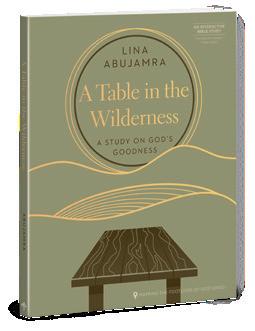
The story behind the Passover table is one of a people who needed rescuing …
If that’s you, you’re in the perfect place to witness God’s goodness. His goodness shines best in our most unexpected places. God’s invitation is for us to sit at His table of salvation. His promise is rescue. My prayer for you this week is that you will let God’s Word lead you where His Spirit longs to take you. Receive all He has for you as you seek His freedom and joy.
Like the people of Israel received, this week is your invitation to sit at God’s table and feast on His goodness in the places where you need to be rescued. P f L

Are you hungry for refreshment? Stories of God’s tables of blessing are woven throughout Scripture. This richly spiritual Bible study shows us to five tables that God shares as reminders of His love, mercy, and overflowing kindness. A Table in the Wilderness offers you to have a seat with us at the tables of:
• Salvation (Passover)—when you need to be rescued
• Unexpected belonging (King David’s table)—when you deserve to be punished
• Overflowing satisfaction (the wedding at Cana)—when you feel empty
• Remembrance (the Lord’s Supper)—when you’re likely to forget
• Eternal celebration (the marriage supper of the Lamb)—when life is hard
Even in the most unexpected places—our weaknesses, our sins, our doubts—God loves to invite us into His presence. Come to the table.
Includes QR code quick link access to streaming videos, spiritual exercises for contemplation and prayer, a self-reflection tool, and a leader’s guide for small group study
BY TAMMY DARLING

Not long ago, my husband and I scheduled a weeklong “celebration vacation” in advance of him being declared cancer-free.
While we didn’t have any guarantee that he would be declared cancer-free, we decided to put action to our faith and schedule a week-long vacation to celebrate. And so, we celebrated. We literally danced. We gave thanks. We laughed. We prayed and praised.
Eleven days after our celebration vacation, the oncologist did indeed announce that my husband was cancer-free. Results of a full body scan showed that radiation had eradicated the remaining cancer that the surgery couldn’t get.
The author of the book of Hebrews wrote that “faith is the substance of things hoped for, the evidence of things not seen” (Heb. 11:1, NKJV). This assurance of things hoped for isn’t talking about the fulfillment of our every whim and
want, but the fulfillment of the promises of God. The evidence of things unseen are those promises yet to be manifested. This is how we can “know that we know” that God’s got this, even if we don’t know when or how. This confidence leads to faith dancing in advance.
Here’s something else we know about faith: James wrote: “For as the body without the spirit is dead, so faith without works is dead also” (James 2:26 NKJV). Could it be that those “works” aren’t as laborious as we think? Could it be that sometimes the “works” that enliven our faith are as simple as celebrating the victory before we see the victory?
Sure, that victory may not come when or even how we think it will, but the expectation of it is still to be celebrated. If someone who loves you says that they mailed you a gift, you’ll eagerly anticipate it, watch for it, and be grateful for it before you ever see it. Why should it be any different
POWER for LIVING® is published quarterly by Scripture Press®, an imprint of David C Cook, DavidCCook.org. © 2025 by David C Cook, 4050 Lee Vance Drive, Colorado Springs, CO 80918, U.S.A. Scripture Press® and David C Cook and the related logos are registered trademarks of David C Cook. All rights reserved. ISBN 978-0-781-44642-6 Printed in South Korea. All Scripture quotations, unless otherwise indicated, are taken from the Holy Bible, New International Version®, NIV® Copyright © 1973, 1978, 1984, 2011 by Biblica, Inc.® Used by permission. All rights reserved worldwide. Scripture quotations marked (NKJV) are taken from the New King James Version®. Copyright © 1982 by Thomas Nelson. Used by permission. All rights reserved. Scripture quotations marked MSG are taken from THE MESSAGE, copyright © 1993, 2002, 2018 by Eugene H. Peterson. Used by permission of NavPress. All rights reserved. Represented by Tyndale House Publishers, a Division of Tyndale House Ministries.
Editor: Karen Scalf Bouchard
Designer: Susan Murdock
Production: Sean McCoy Vol. 86, No. 1
with our faith and the promises of God? Because the Giver is good, we can expect His gifts to us to be good; therefore, we can dance in advance.
Sometimes, via my sanctified imagination, I picture myself dancing with Jesus. Sometimes it’s a fastpaced dance of joy and celebration. Other times, however, it’s a slow while-I’m-waiting kind of dance. These times are precious and help me to keep my mind “on things above, not on things on the earth” (Col. 3:2, NKJV). Instead of becoming discouraged by what’s happening around me, I focus on God’s promise to work all things together for good (see Rom. 8:28), which then enables me to dance in advance.
Several years ago I found myself waiting (and waiting!) for a promise from God to come to fulfillment. I’m talking years in the making. When I didn’t feel as though I could hold on any longer, I decided to dance in advance by writing an encouraging devotional book for people waiting for a similar promise to be fulfilled. In doing so, I proactively gave thanks and demonstrated my faith before the promise came to fruition.
Life was never meant to be scary, but an adventure. We were created
for adventure. And every adventure contains elements of uncertainty and surprise. Amid uncertainty and surprises, our security—our trust—is in Christ. But only when that trust in God is settled deep within us will we be able to dance in advance.
As you think about what you’re currently going through, struggling with, or waiting for, what might “dancing in advance” look like for you? Our dances won’t look the same in every situation, but they will always contain a measure of praise and thanksgiving. Dancing in advance brings breakthrough, in your circumstances or in your heart. And because you spent time dancing instead of worrying, the coming victory will be so much sweeter.
When the battle is brutal, dance in advance. The fight may not be over, but the war has already been won. Jesus saw to that. And for that very reason, we can dance even before our circumstances change.
There’s victory in the dance, a power and joy that can come no other way. Faith rises, strength is restored. We can go on with confidence that God’s promises will be fulfilled. When we dance in advance, we put feet to our faith.
SUNDAY
MONDAY
TUESDAY
WEDNESDAY
THURSDAY
FRIDAY
SATURDAY
Deuteronomy 27—28
Deuteronomy 29—30
Deuteronomy 31—34
Joshua 1—5
Joshua 6—8
Joshua 9—12
Joshua 13—21

Fancy cars, fine houses, luxurious yachts—there is no end to the “things” a person can purchase if he or she has enough money. But God has prepared something for you that is so great, money could never buy it. Even the wealthiest billionaire who ever lived could not purchase it. Your brain could never even imagine it. This great thing He has prepared for you is the glory of Heaven.
One day, our eyes will see mansions that will be greater than any house on earth. And one of them will be ours. Also, when we look at the landscape of the world to come, it will contain unspeakable
brilliance that will always be new. And what makes all of this so wonderful is, it won’t cost us a dime. We have a kingdom that has been set up for us, and only one thing qualifies us for it—that we be God’s beloved children. We are destined for a kingdom that was purchased for us by God’s own dear Son. It is a kingdom of grace.
Today, as you face your current circumstances, remember that there is a world beyond the one you see now—a world that has been prepared just for you. And whether you are rich or poor, you will someday live in this wonderful place that God has prepared for you.
No one’s ever seen or heard anything like this, Never so much as imagined anything quite like it—What God has arranged for those who love him. – 1 Corinthians 2:9 (MSG) From Daily Grace: Devotional Reflections to Nourish Your Soul. © 2005 Bordon Books. Used by permission.



“In a surge of anger I hid my face from you for a moment, but with everlasting kindness I will have compassion on you,” says the LORD your Redeemer. Isaiah 54:8
Quiet Hour® is published quarterly by David C Cook, DavidCCook.org. © 2025 by David C Cook, 4050 Lee Vance Drive, Colorado Springs, CO 80918, U.S.A. Bible-in-Life® and Echoes® and David C Cook and its related logo are registered trademarks of David C Cook. All rights reserved. Bible-in-Life® ISBN 978-0-781-44769-0. Echoes® ISBN 978-0-781-44617-4. Printed in South Korea. All Scripture quotations, unless otherwise indicated, are taken from the Holy Bible, New International Version®, NIV® Copyright © 1973, 1978, 1984, 2011 by Biblica, Inc.® Used by permission. All rights reserved worldwide. Scripture quotations marked (KJV) are taken from the King James Version. Lessons and/or Readings are based on the Uniform Series International Sunday School Lessons International Bible Lessons for Christian Teaching Copyright © 2022 National Council of the Churches of Christ in the USA. Used by permission. All rights reserved. Digital products are subject to the End User License Agreement (EULA) found at DavidCCook.org/ EULA/ and any additional terms or restrictions that may accompany the product. Digital products cannot be returned, sold, or relicensed. This product license is good for 6 months. After 6 months, you must purchase another license.
Editors: Karen Cain, Christine Dallman
Cover Design: Dale Johnson
Design & Production: Dale Meyers Vol. 89, No. 1
“Who has woe? Who has sorrow?” (Proverbs 23:29)
Scripture: Proverbs 23:29–35
Song: “I Need Thee Every Hour”
Teaching is full of magical moments when children discover something new. Take, for instance, magnets. Kids are spellbound when they inch a paperclip toward a magnet, jumping in surprise when it’s suddenly snatched. They ooh and aah as a magnet hanging from a string lifts a nail without ever touching it. Magnets affect objects at a subatomic level, realigning electrons, creating predictable reactions.
The verses in Proverbs discuss another kind of magnetic attraction and its consequences. Though the topic is drunkenness, the truths apply to any temptation. The more enamored we become, the more power temptation has to realign our thoughts and distract our attention from God. If we give ourselves over to it, the writer warns of the woes and sorrows that follow.
The force exerted by a magnetic eld drops off with increasing distance. It’s also repelled by another magnet. Through prayer and re ection, we can identify and move away from temptations that pull our focus from God. Then we can ask Him—a force far more powerful—to repel temptation’s control and draw us close.
Father, save me from the pull of sin, align my thoughts with Yours, and hold me near. In Jesus’ name I pray. Amen.
October 13–19. Cindy Peavy, an Alabama teacher and writer, explores the miracles of creation while hiking and kayaking across the country.
“Whatever your hand nds to do, do it with all your might.” (Ecclesiastes 9:10)
Scripture: Ecclesiastes 9:4–10
Song: “Rise Up, O Men of God”
Late nineteenth-century India was no place for an orphaned girl. Societal tradition discouraged the education of women, considered conversion to Christianity a betrayal, and condemned widows to a life of poverty. Yet holy men granted Ramabai Dongre the title Pandita , “the learned one,” for her reading and teaching of Hindu holy texts. She became a Christian when she read of Jesus’ compassion for women and witnessed nuns caring for prostitutes. She built a shelter where widows and children could be educated, a haven that ignited revival in India. Whatever her hands found to do, Pandita Ramabai did with all her might.
Today’s Scripture encourages us to get busy, to see what wrongs need righted, which people crave love, what needs must be lled. As long as we’re alive, we have hope that these things can change. We’re instructed to enjoy the present; but knowing that it’s going to end, we should put all we’ve got into doing what needs done. There’s a time coming when there will be no time left.
Knowing all that Pandita Ramabai accomplished intimidates me. But why she did it inspires me. Because she was an orphan and a young widow, her hands touched injustice and she worked to change it. What’s close enough to touch in our lives? Where can we make a difference?
Father, when I reach out my hands, may I find the work that so urgently needs done. In Jesus’ name I pray. Amen.
“Be very careful, then, how you live.” (Ephesians 5:15)
Scripture: Ephesians 5:11–19
Song: “Shine a Light”
To kayak in Alabama is to enter a world of green. The alligatorcolored river serpentines through the scene. Trees stretch toward the sun, their leaves the colors of parakeets, pears, and pickles. Even the ground appears green, teeming with scrubby growth. Paddling in this green, I once spotted a distant scarlet tanager (a kind of bird), its bright red body a ashy contrast to the verdant backdrop. Contrasts help us notice things we might otherwise miss, and Paul uses this device to teach us. He cautions us to avoid the darkness of sin, which is exposed by its opposite, the light of God. He advises us to live as wise followers and to seek understanding of God’s will, contrasting the wise with the unwise and foolish, who miss opportunities to ful ll His design. And he warns us not to get drunk, to be Spirit- lled instead, so our hearts and voices are prepared to worship and serve God.
Through these contrasts, Paul teaches us how to live a testimonial life. Not only does the light of God expose the darkness, but our lives can too. When we live carefully, allowing ourselves to be lled with the Spirit, we have greater protection from temptations, greater knowledge of God’s will, and greater awareness of moments to testify or serve. As a result, our lives may cast light upon the darkness in others’ lives, and the awareness of this contrast may encourage repentance.
Father, may Your Spirit help me live my life carefully so I can be a light to those around me. In Jesus’ name I pray. Amen.
“Throughout the period of their dedication, they are consecrated to the LORD.” (Numbers 6:8)
Scripture: Numbers 6:1–8
Song: “I Surrender All”
As soon as I could count, my grandfather taught me to play dominoes. I’d place a tile, and inevitably, he’d explain how I could’ve scored more in a different spot. But he never allowed me to change my move, insisting that “a domino laid is a domino played.” At eight, when I nally beat him, I felt the pride of a well-earned win. After he died, my grandmother asked if I wanted anything of his. I didn’t hesitate. Those worn-out dominoes became a treasured possession.
Today’s passage shows a similar transformation from common to signi cant. The Lord tells Moses that consecration can take place through everyday changes in what we eat or drink, how we look, or with whom we associate. These common changes don’t have inherent value any more than old dominoes. Their worth comes from their meaning, the holy purpose of drawing us to God.
No matter how much we sacri ce, we can’t earn the right to come before God’s throne. That right comes only through Jesus. But if we desire to consecrate ourselves so we can draw even closer to God, our sacri ces gain signi cance. We can offer time for worship and prayer, income to help others, or a change in our diet or appearance to express our love and devotion to God. Like treasured dominoes, even common things become holy when we dedicate them to God.
Father, may my everyday sacrifices serve the holy purpose of drawing me closer to You. In Jesus’ name I pray. Amen. October 16
“Live in order to please God.” (1 Thessalonians 4:1)
Scripture: 1 Thessalonians 4:1–7
Song: “To Be Pleasing You”
Sergei Rachmaninoff towers among classical musicians, not for his imposing 6'6" height, but for his virtuosity as a composer and concert pianist. His success wasn’t accidental. After his early training, Rachmaninoff maintained a practice schedule of at least four hours daily. As a result of this rigorous routine, his ngers—which spanned 12 keys— ew awlessly in emotional, breathtaking performances. Even just months before his death, despite suffering from arthritis and exhaustion, Rachmaninoff delivered a performance so moving that the audience gave him a prolonged ovation that thundered through Carnegie Hall.
Rachmaninoff never settled for being good. He wanted to become even better. In today’s passage, Paul encourages the young church in Thessalonica to do the same. He praises them for living in order to please God, while urging them to “do this more and more” (v. 1). One way to please God, Paul says, is through purity, learning to control the impulses of the body.
The goal is sancti cation. But holy perfection is impossible! Knowing we can’t reach the goal could be discouraging. However, Paul’s use of “more and more” shows us that it’s an ongoing process. It reminds us to keep moving forward, to make daily choices in favor of holiness. Even after we are forgiven by God, we can keep growing through the help of the Holy Spirit.
Father, help me practice making pure choices today so that I can compose a holy life that pleases You. In Jesus’ name I pray. Amen.
Let us be awake and sober. (1 Thessalonians 5:6)
Scripture: 1 Thessalonians 5:1–10
Song: “Will Jesus Find Us Watching”
Once called “Eternity’s Timepiece,” Yellowstone’s famous geyser is now known as Old Faithful. Though not quite like clockwork, Old Faithful’s daily eruptions can be accurately predicted within 10 minutes 90 percent of the time. Because visitors know when to expect an eruption, they wait on benches, watching for signs of increased bubbling and playful spouts of water hurled higher and higher until the geyser reaches its full 180-foot height. Yellowstone’s less-predictable geysers don’t draw the crowds that Old Faithful does. When the time is unknown, people are less likely to wait and watch.
Paul—the writer of 1 Thessalonians—understands this tendency. Because believers don’t know the time or day of Christ’s return, he warns that they could be pulled away from waiting and watching. Just like unbelievers who go about their lives unprepared, believers can be lulled into carelessness and temptation. Paul encourages the Thessalonians to be alert and exercise selfcontrol by protecting their hearts and their minds.
If we knew when Jesus was coming, we’d want to be ready. We might pray more fervently, repent more fully, live more purely, and pursue the lost more urgently. We’d wait on the benches, watching for signs, knowing that soon we’d experience the comfort of Jesus’ presence. That day is coming. Let’s be watchful and ready.
Father, help me live today like it is the day of Your return. In Jesus’ name I pray. Amen.
“We have obeyed everything our forefather . . . commanded us.” (Jeremiah 35:8)
Scripture: Jeremiah 35:5–11
Song: “Teach Me to Obey”
Routines and rituals help to form our families. Decades of research show that positive routines foster an emotional connection, develop a group identity, and create a sense of belonging. From family meals and chores to Sunday church and birthday parties, these moments of connection forge strong family bonds. Through the right kind of routines, marriages and family ties grow stronger, and children learn from their parents’ example of peace and emotional wellbeing.
The Rekabite family illustrates a united family. Out of honor for their ancestor, they practiced a different way of life. They lived in tents, drank no wine, and didn’t farm. Their traditions de ned them as a group, preserving their family, teaching them to live as a community, and arming them against temptations. The prophet Jeremiah held up the Recabites as an example of obedience at a time when Israel struggled to obey God.
We can learn much about obedience from the Rekabites as well. Like them, we have a Father who loves us. He has asked us to love Him, to abide in Him, to pray, to be baptized, to repent and forgive, to love and serve others, to make disciples of the nations. Like the family of Jonadab’s descendants, obeying God’s commands knits us together as a family of believers and connects us to God, our heavenly Father.
Father, I’m so thankful to be part of Your family. Help me find joy in following Your traditions, participating in Your rituals, and obeying Your commands. In Jesus’ name I pray. Amen.
A regular devotion time is the perfect moment to go to God with requests, concerns, and praises. Use this space to remind yourself of particular needs that you wish to bring before God, and be sure to capture how you experience God’s answers to your prayers.
Name Request/Concern/Praise


Author Strahan Coleman offers readers guidance on how to have a transformative relationship with God. In Beholding, Coleman redefines prayer as a way of being with God, emphasizing its role in deepening our connection and enriching our spiritual lives. Thirsting explores our deep yearning for God, guiding us to embrace this spiritual thirst and experience a profound, intimate communion with God.



September–November

As a Christian education director, superintendent, or pastor, you strive to achieve excellence in your Sunday school ministry. You recruit and train gifted, dedicated teachers. You select curriculum that helps students become “doers of the word, and not hearers only” (James 1:22). Your goal is to help every student from preschool to adult “grow in grace, and in the knowledge of our Lord and Saviour Jesus Christ” (2 Peter 3:18).
This publication—the CROSS/Echoes Sunday School Superintendent’s Handbook helps you do your best to accomplish your ministry goals. Here are some suggested ways to use this Handbook:
1. The Church and Home Theme: Each Sunday, this theme serves as the foundation for your entire Sunday school. Every activity for every student revolves around this one theme. This provides a “big picture” for the church while allowing the variety of agelevel Sunday school lessons needed to support biblical discipleship. The varying learning needs of children and adults are met.
By revealing the big picture of the lessons, you gain the unity and order that leaders need. Teachers can see the value of their individual service within the larger teaching ministry. Families can feel a greater sense of unity when you give them this theme that shows how their different lessons are connected. All family members can study the same theme as it applies to each of their lessons.
2. Order of Service: Each Sunday, the Order of Service provides opening exercises including suggested songs, Scripture readings, prayer, and
responsive reading based upon the quarterly Church and Home Theme. Lesson exercises include a short devotion, the Church and Home Theme Talk, age-level lesson summaries, and guidelines for conducting Lesson Reviews, including a closing program.
3. Lesson Reviews: Each Sunday’s Church and Home Theme Talk can be repeated during the Review time. The Age-Level Summaries are the superintendent’s guidelines to ensure that learning stays on track and that reviews are meaningful to the whole congregation. The Superintendent’s Church and Home Link reminds the entire church congregation of the importance of unity and continuity.
4. Teacher Training: See the teacher training material on pages 21 and 22 of this Handbook. You can use this to recruit new teachers and unite your teaching staff. If you have a weekly teacher-training session, each Order of Service page gives you the overview to help prepare your teachers for that Sunday. If you meet monthly or quarterly with teachers, read through the appropriate Order of Service pages and use them as the foundation for your teacher-training meeting.
5. Sermon Coordination and More: If you want to coordinate the Sunday sermon with the Sunday school lessons, use this Handbook to assist in identifying specific points to make and bringing out truths in each Sunday’s message. You may also choose family Bible study topics, small-group Bible studies, as well as youth and children’s activities that fit with the quarter’s theme.
This Quarter’s Church and Home Theme: GOD REDEEMS AND RESTORES US
CROSS/Echoes embraces the need for unity in the Sunday school program with this whole church theme. We thought long and hard, asking ourselves, What is the best way to achieve meaningful unity? Even if all classes study the same Scripture, the lessons will, and should, be different. Students of different ages will understand and apply the Scripture differently—and that is appropriate if we are to meet the developmental needs of each student. Some may suggest that we limit ourselves to Scripture passages that all ages will understand. But that approach would deprive older children and adults of the challenging Scriptures they need for further growth.
CROSS/Echoes has chosen this unique course: We have selected age-appropriate Scriptures for each age level and have built appropriate lessons from those Scriptures for growth at all age levels. Then we unified these diverse lessons together with a quarterly Church and Home Theme. So, each class is age-appropriate, and all the classes revolve around the same Bible precept. This enables you, the Sunday school leader, to guide all your classes toward a common goal—age-appropriate, biblical discipleship.
This quarter’s Church and Home Theme is “God Redeems and Restores Us.” God has redeemed us from the curse with the precious blood of Christ and He has restored us to a position of honor, fellowship, and relationship with God. He restores our souls. He restores the joy of our salvation. He restores our health. What a wonderful God we serve. He is worthy of praise, glory, and honor! So, “let the redeemed of the Lord say so, whom he hath redeemed from the hand of the enemy” (Ps. 107:2, KJV).
This handbook will help you and your teachers follow God’s calling in your Christian education ministry. Mention “God Redeems and Restores Us” in Sunday school exercises. Emphasize it in your teacher-training meetings. Remind teachers that spiritual growth can occur in their classes as they use their gifts in love. Each Sunday, encourage families to study the theme throughout the week.
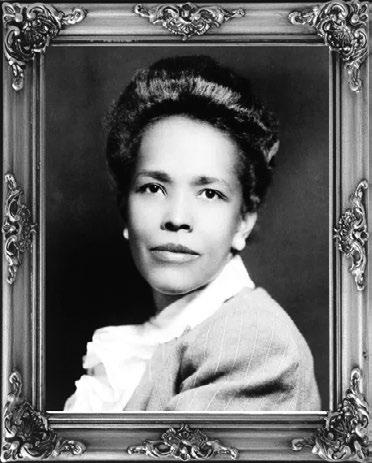
by Juliet Liu
Among the many individuals who played a role in the civil rights movement of the mid-twentieth century, Ella Baker stands out as a unique representation of leadership. People like Dr. Martin Luther King Jr. and Malcolm X may be the first names coming to mind when discussing the movement, but Baker’s service was no less profound, even though her name is not well-known. Ella Baker shows the meaning of Christlike leadership—not seeking to be a charismatic person in the spotlight but accepting the role of a quiet servant, one who raises others up. She demonstrates that true leadership is rooted in giving and empowering others.
Born on December 13, 1903, in the state of Virginia, Ella Baker grew up in a family that valued education and community activism. Her grandmother was born into slavery, and her parents instilled in her a strong sense of justice and the importance of standing up against inequality. After Baker’s
grandparents gained their freedom, they purchased a small parcel of land that they were able to farm. Neighbors in need often knocked on the door, and young Ella noticed that no one was turned away without something to eat.
Baker attended the New York College for Teachers (now the City University of New York) and graduated in 1927. Her education provided her with academic knowledge and a grounding in social justice. After college, she began a career as a teacher. Soon her passion for activism took center stage in her professional and personal life. This activism was rooted in the stories her grandmother told, about what it was like to grow up enslaved. Ella had also witnessed the generous community her grandparents provided throughout her childhood.
"Strong people don't need strong leaders."
Activism and the NAACP
Baker demonstrated her commitment to civil rights in the 1930s when she began working with the National Association for the Advancement of Colored People (NAACP). Beginning as a volunteer, her hard work and determination quickly advanced her to several leadership roles. Throughout the 1940s, Baker acted as the organization’s first field secretary. She traveled across the South, advocating for voter registration, organizing grassroots campaigns, and responding to lynchings and segregation.
Baker believed in the power of ordinary people to effect change, and her role only made her more certain. This belief would shape her approach to leadership throughout her life, as she began to witness that real power lies in collective action, not in the visibility of individuals.
In 1957, Baker founded the Southern Christian Leadership Conference (SCLC) alongside Dr. Martin Luther King Jr. and other prominent Black Christian figures. As she worked with Dr. King, Baker began to see her vision of leadership diverge from many male counterparts in the SCLC.
Several of these men emphasized a centralized, charismatic leadership model: they believed only strong leadership would drive the civil rights movement forward. But Baker advocated for the opposite—a more decentralized, democratic approach to organization. She believed that leadership should not just arise from public speakers in the limelight but from ordinary members of the community. For Baker, it was essential to nurture the skills and voices of those who might otherwise remain unheard.
Baker’s commitment to empowering others became especially evident in her approach to youth activism. She understood the necessity to engage young people in the civil rights movement and recognized their capacity to drive change. This commitment culminated in her involvement with the Student Nonviolent Coordinating Committee (SNCC), which she helped to organize in 1960. While the SCLC and the NAACP had always made efforts to convince young activists to join their existing organizational structure, Baker feared that young students would not be taken seriously or allowed to contribute in their own unique ways. Baker encouraged the college students to create their own movement instead. Through SNCC, Baker inspired a generation of young men and women to an active rather than passive role in the struggle for civil rights.
Behind closed doors, Baker was known to challenge Dr. King for his comfort in the spotlight. She argued that, if people were tempted to worship and follow him as an extraordinary hero figure, this would not be good for the movement in the long run. An emphasis on Dr. King and other charismatic leaders might cause ordinary citizens to question their own ability to make meaningful contributions. Baker challenged Dr. King to step out of the spotlight and to raise up leaders alongside him, but this request created friction between the pair. Ella Baker did not back down, and she continued to grow the movement in her own ways. One of her most significant contributions was her belief in the power of collective decision-making. Baker famously stated, “Strong people don’t need strong leaders.” This philosophy emphasizes the importance of empowering individuals to take ownership of their activism. It is all too easy to tell ourselves, Someone else can be the one to do it. Baker encouraged others to
think critically and to take action; she fostered a sense of agency among those she mentored.
Defined by humility and a focus on service rather than personal acclaim, Baker’s leadership style was both distinctive and effective. As she worked behind the scenes, provided support and guidance to others—while deliberately avoiding the spotlight for herself—Baker modeled a different path for future leaders. Her mentorship extended beyond mere guidance; she invested in the growth, contributions, and success of all those around her. Many activists who worked with Baker, figures like John Lewis and Diane Nash, credit her with shaping their understanding of leadership and activism.
Ella Baker’s life reminds others of the leadership style of Jesus, who told His disciples that anyone wishing to be a leader must first be a servant of others (Mark 10:43–45). She embodied this principle, demonstrating that true leadership is not about seeking power or recognition but about lifting others up and serving the community. Despite her significant contributions, Baker’s name is often overlooked in narratives of the civil rights movement, even though she had a role in three organizations: the NAACP, SCLC, and SNCC. This oversight shows that society still tends to celebrate charismatic leadership, while neglecting the quiet, behind-the-scenes work that is just as impactful—if not more so.
But Baker’s legacy lives on and continues to influence activists and leaders today, especially those who value collaboration and community engagement. In a world that values charisma and personal glory, Baker’s example says, Think again. She teaches that effective leaders emerge from the community, driven by a passion for justice and a commitment to the good of others. In our churches and communities, let us cultivate an environment where every voice is heard and valued, echoing Baker’s belief that strong people act, even in the absence of strong leaders. When we embrace servant leadership, we foster a culture of collaboration, empathy, and empowerment, ensuring that the legacy of Ella Baker lives on.
True leadership is rooted in giving and empowering others.
(this page is reproducible)
A bird’s-eye view of each week’s lesson plan for the entire church. You may make copies of the Sunday school Order of Service for purposes of teacher training.
Church and Home Theme:
Your big picture or foundation for the whole church—all Sunday school lessons and activities revolve around this theme at church. Families use the same theme to reinforce learning at home.
Church and Home Theme
“Put your hope in God.” (Ps. 42:5b). This week’s lessons give many reasons to put our hope in God, who gives us all things.
Sunday September 4 2011
Opening:
Theme Talk:
Use as an opening meditation before dismissal to classes; superintendent’s part in review at reassembly; and/or talk for teachertraining meeting.
Summaries:
See this bird’s-eye view of exactly how the age-level lessons parallel the Church and Home Theme. This lesson review and teacher-training reference for the superintendent is also a home Bible study reference for families.
Opening Signal
Theme-Related Songs: “Showers of Blessings”; “Wade in the Water”; “Ship of Zion”; “Blessed Quietness”; and “Near the Cross.”
Theme Talk: God’s Word echoes through the prophet Isaiah to us today: Our God Gives. He gives us everything we need to live for Him. His Word is living water He freely offers to us. Our ability to receive this living water and to respond differs depending on where we are in life and in the Lord. Some of us are suckling babes in the nursery. Others are just being trained up in the way that we should go. Mature saints are continuing diligently to seek Him.
We can seek God and depend upon Him just like the Bible people did—Moses, the leader; King Solomon; Samuel, the prophet; Miriam, the child—and God will give us what we need of Him.
Age-Level Summaries: All of today’s lessons link with the Church and Home Theme: Our God Gives.
ADULT: John the Baptist prepares the way (Mark 1:1–8; Matt. 3:1–3). God gives us changed hearts when we repent.
HIGH SCHOOL: God gives us His Word to help us choose wisely to follow Him (Prov. 1:1–7). Get wisdom from God, get undestanding, and seek to live according to God’s plan.
MIDDLE SCHOOL: God gives us the choice of following His plan. (1 Sam. 8:4–10, 19–22). Be wise. Follow God, not negative
Signal to Reassemble Reassemble Classes Lesson Reviews by Classes Remarks by Pastor
Scripture Readings: Isaiah 55:1a, 2b, 3a, 10–11; Ephesians 3:20
Scripture Readings: Isa. 43:10-13; 2 Cor. 12:7-9
Prayer Call and Response: The Lord Our Provider
Prayer Call and Response: God’s Unfailing Love
L ESSON
Scripture Readings: Isa. 43:10-13; 2 Cor. 12:7-9
peer pressure.
Prayer Call and Response: The Lord Our Provider
UPPER ELEMENTARY: God gives us the choice of following His plan. (1 Sam. 8—10). Follow God instead of trying to be like everyone else.
ELEMENTARY: God gives His plans to young Samuel, who listens and obeys (1 Sam. 3:1–19). Students should listen carefully to God’s directions for them.
EARLY ELEMENTARY: God calls Abraham to a new land (Gen. 12:1-9). God takes care of His people because of His unfailing love
PRESCHOOL: Jesus gives the Samaritan woman hope as she drinks from living waters (John 4:4–26). We can teach the children that they are important to Jesus, even when they feel all alone.
Dismissal to Class: Announce the class(es) that will do the lesson review when you reassemble. Tell students they will share how they will apply Bible learning in their own lives today at church and at home. (Tell teachers that younger students’ review may include showing a craft they have made in class or a visual from the Creative Teaching Aids. Older students may share the Bible truth, memory verse, and a life response to Step 4 of their lessons.)
CLOSING
It may also be used as a devotion for teachertraining time, Christian education meetings, or meetings with the pastor. Add your practice of a responsive Scripture reading, or denominational, church, or school creed. You may also call roll at this time if that is your practice.
Scripture Readings: Isa. 43:10-13; 2 Cor. 12:7-9
Prayer Call and Response: The Lord Our Provider
Superintendent’s Church and Home Link: At the beginning of each class, ask one of your students to share a brief testimony of how God has shown His love for them. Please be mindful of your take-home books and materials. Closing Benediction
Page 9
Superintendent’s Church and Home Link: Remind all students to take their lessons home for further study. Challenge members of the church body to respond to the Sunday school lesson from God’s Word by applying it to their home lives and community activities.
Dismissal to Classes: Appoint classes for review after the lesson. Tips for conducting lesson review.
Church and Home Theme
“Alas! and did my Savior bleed? and did my Sovereign die?” The hymn “At the Cross” reminds us of God’s great plan to redeem and restore us by sending His Son to die for us.
Opening Signal
Theme-Related Songs: “At the Cross”; “Glory, Glory”; “O How I Love Jesus”; or a song of your choice
Theme Talk: From his sermon “Love Your Enemies,” Martin Luther King, Jr., made these profound remarks: “To those who hate us we shall say, ‘we shall match your capacity to inflict suffering with our capacity to endure suffering. Do to us what you will, and we shall continue to love you. Throw us in jail. Bomb our homes and threaten our children. Send your hooded perpetrators of violence into our communities at midnight and beat us and leave us for half-dead, and we shall still love you. But be ye assured that we will wear you down by our capacity to suffer.’ ” God is able to redeem us and restore us in the face of seemingly insurmountable obstacles because His grace abounds where sin abounds (Rom. 5:20), and He wore down the sting of death by His Son’s suffering on the cross (1 Cor. 15:55).
Age Level Summaries: All of today’s lessons link with the Church and Home Theme: God Redeems and Restores Us.
ADULT: Isaiah and Hezekiah surrender and allow God to bring transformation (Isa. 6:1–8; 38:1–5). God makes people His messengers.
HIGH SCHOOL: Moses has faith to step out for God (Heb. 11:23–28). God calls His redeemed and restored people to let their faith guide their actions.
MIDDLE SCHOOL: God prepares and
Signal to Reassemble
Reassemble Classes
Lesson Reviews by Classes
Remarks by Pastor
Scripture Readings: Isa. 43:10-13; 2 Cor. 12:7-9
Scripture Readings: Romans 8:1–11
Prayer
Prayer
Call and Response: The Lord Our Provider
Call and Response: God Redeems and Restores Us
Scripture Readings: Isa. 43:10-13; 2 Cor. 12:7-9
Prayer
Call and Response: The Lord Our Provider
calls Moses to free the Israelites (Ex. 2:3–10, 15; 3:1–10; Acts 7:22). God prepares people to minister His redemption and restoration to others.
UPPER ELEMENTARY: Moses fails as he attempts to help God’s people in his own way (Ex. 1:7–2:15). God’s way of redeeming and restoring is not always our way.
ELEMENTARY: Miriam helps protect Moses from danger (Ex. 1:1–2:10). God redeems and restores His people from danger.
EARLY ELEMENTARY: Miriam cares for baby Moses (Ex. 1:6–2:10). We can thank God for family members who help care for us.
PRESCHOOL: Hannah and her husband have a baby (1 Sam. 1:1–23). Families come from God.
Dismissal to Classes: Announce the class(es) that will do the lesson review when you reassemble. Tell students they will share how they will apply Bible learning in their own lives today—at church and at home. (Tell teachers that younger students’ review may include showing a craft they have made in class or a visual from the Creative Teaching Aids. Older students may share the Bible Truth, memory verse, or a life response from Step 4 of their lessons.)
Scripture Readings: Isa. 43:10-13; 2 Cor. 12:7-9
Prayer
Call and Response: The Lord Our Provider
Superintendent’s Church and Home Link: Make a list of all your family members—past and present—who have accepted God’s redemption. Use the list to praise God, as well as to pray for those who are not yet saved or need restoration. Be mindful of your take-home books and materials.
Closing Benediction
Church and Home Theme
“O Victory in Jesus, my Savior, forever. He sought me and bought me with His redeeming blood.” God redeems us on the merits of the shed blood of His Son, Jesus!
Opening Signal
Theme-Related Songs: “Victory in Jesus”; Victory is Mine”; “Jesus Paid it All”; or a song of your choice
Theme Talk: If salvation were delivered like a postal package, an invoice would list its contents: redemption, reconciliation, regeneration, security, justification, and peace with God. But wait, there’s more! We also get forgiveness for sins of the past, power for living in the present, and hope for eternal life. This package comes with an unconditional guarantee that it can “never perish, spoil or fade” because it is “kept in heaven for you” (1 Peter 1:4). God has given His personal promise that in this package, “His divine power has given us everything we need for life and godliness” (2 Peter 1:3). The bill would be made out to Jesus Christ, and marked “Paid” through five installments—birth, life, death, burial, and resurrection. God’s plan to redeem and restore us is an expensive order. Grace is free, but it is not cheap.
Age Level Summaries: All of today’s lessons link with the Church and Home Theme: God Redeems and Restores Us.
ADULT: Hezekiah uses Passover to invite people from all the land (2 Chron. 30:1–9; 26–27). God invites us to return to Him.
HIGH SCHOOL: Stephen tells how Moses was used by God (Acts 7:22–31, 35–37). God’s redeemed and restored people speak of His plan.
MIDDLE SCHOOL: Moses persists with Pharaoh and waits for God to act (Ex. 5:1–2,
Signal to Reassemble Reassemble Classes
Lesson Reviews by Classes
Remarks by Pastor
Scripture Readings: Isa. 43:10-13; 2 Cor. 12:7-9
Scripture Readings: 1 Peter 1:3–9
Prayer
Prayer Call and Response: The Lord Our Provider
Call and Response: God Redeems and Restores Us
22–6:6). God’s redemption and restoration doesn’t always come quickly; we must trust Him.
Scripture Readings: Isa. 43:10-13; 2 Cor. 12:7-9
Prayer Call and Response: The Lord Our Provider
UPPER ELEMENTARY: Moses is willing to face his enemies (Ex. 3:1–4:20). God provides His redeemed and restored people with the strength to carry out His ways when they are willing to follow Him.
ELEMENTARY: God instructs Moses at the burning bush (Ex. 3:1–4:20). When God asks His redeemed people to do hard things, He provides what we need to see it through.
EARLY ELEMENTARY: Aaron’s abilities help Moses in speaking (Ex. 3–4; 12). We can help our family members in many ways.
PRESCHOOL: Boaz and Ruth marry and have a child (Ruth 1–4). We can thank God for the people in our families.
Dismissal to Classes: Announce the class(es) that will do the lesson review when you reassemble. Tell students they will share how they will apply Bible learning in their own lives today—at church and at home. (Tell teachers that younger students’ review may include showing a craft they have made in class or a visual from the Creative Teaching Aids. Older students may share the Bible Truth, memory verse, and a life response to Step 4 of their lessons.)
Scripture Readings: Isa. 43:10-13; 2 Cor. 12:7-9
Prayer
Call and Response: The Lord Our Provider
Superintendent’s Church and Home Link: Over this next week, consider ways God has shown His redemption and restoration in your relationships. Please be mindful of your take-home books and materials.
Closing Benediction
Church and Home Theme
“Amazing grace, how sweet the sound that saved a wretch like me. I once was lost, but now am found, was blind but now I see.” This classic hymn is loved by all because it speaks so clearly of God’s ability to restore anyone, no matter how much they’ve sinned.
Opening Signal
Theme-Related Songs: “Amazing Grace”; “Lord Make Me Over”; “I Will Trust in the Lord”; or a song of your choice
Theme Talk: There are many things we don’t completely understand, yet we would be foolish not to use them. Most of us don’t understand electricity, but we’re not going to sit in the dark until we do. We go to a doctor whose knowledge we can’t comprehend, we get a prescription we cannot read, we take it to a pharmacist whom we don’t know who gives us medicine containing ingredients of which we’re ignorant. But we take the medicine because we believe it will make us better! The same is true of salvation. No one fully understands how God could become man, how He could die, how His death and resurrection could be the basis for our forgiveness, how He could give us a new life, and the many other dimensions of salvation. But we would be foolish to ignore God’s perfect plan to redeem and restore us to Himself.
Age Level Summaries: All of today’s lessons link with the Church and Home Theme: God Redeems and Restores Us.
ADULT: King Josiah is shocked to hear part of God’s law for the first time (2 Chron. 34:15–22, 26–27). God works through Scripture to reform us.
HIGH SCHOOL: Moses’ perseverance is honored in later centuries (Luke 9:28–31; John 1:17; 5:45–46; Heb. 3:5–6). God uses His people to accomplish His plan of redemption and restoration.
Signal to Reassemble
Reassemble Classes
Lesson Reviews by Classes
Remarks by Pastor
Scripture Readings: Psalm 116:12–13; Ephesians 2:8–10
Scripture Readings: Isa. 43:10-13; 2 Cor. 12:7-9
Prayer
Call and Response: The Lord Our Provider
Prayer
Call and Response: God Redeems and Restores Us
Scripture Readings: Isa. 43:10-13; 2 Cor. 12:7-9
Prayer
Call and Response: The Lord Our Provider
MIDDLE SCHOOL: The Passover illustrates how God brought His people through salvation, redemption, and restoration (Ex. 12:1–3, 5–7, 12–14). God wants us to celebrate His deliverance so we do not forget what He has done for us.
UPPER ELEMENTARY: Moses persists in spite of a stubborn ruler (Ex. 5:1–10:29). As God redeems and restores, He teaches patience.
ELEMENTARY: Moses keeps on trying (Ex. 5:1–10:29). God redeems and restores even if we do not see success right away.
EARLY ELEMENTARY: Jethro helps Moses make wise choices (Ex. 18). God gives us adult family members to help us know the best thing to do.
PRESCHOOL: Abraham’s and Lot’s servants quarrel (Gen. 13:1–12). We can share with our families.
Dismissal to Classes: Announce the class(es) that will do the lesson review when you reassemble. Tell students they will share how they will apply Bible learning in their own lives today—at church and at home. (Tell teachers that younger students’ review may include showing a craft they have made in class or a visual from the Creative Teaching Aids. Older students may share the Bible Truth, memory verse, and a life response to Step 4 of their lessons.)
Scripture Readings: Isa. 43:10-13; 2 Cor. 12:7-9
Prayer
Call and Response: The Lord Our Provider
Superintendent’s Church and Home Link: Encourage families to invite a friend to church next Sunday to hear the redemptive, restorative Good News. Don’t forget your take-home materials. Closing Benediction
Church and Home Theme
The hymn “To God Be the Glory” speaks of how Jesus “yielded His life an atonement for sin and opened the life gate that all may go in.” Rejoice that God’s plan of restoration is available to all!
Opening Signal
Theme-Related Songs: “Your Grace and Mercy”; “If It Had Not Been For the Lord on My Side”; “Victory is Mine”; or a song of your choice
Theme Talk: It is reported that the emperor Napoleon once looked at a map and said, “If it were not for that one red dot, I could rule the world.” That red dot was the British Empire, the one place on the map he couldn’t conquer. Satan’s a lot like Napoleon. He looks at the cross and says, “If it were not for that one red-stained cross, I could conquer the human race.” We escape Satan’s clutches because some 2,000 years ago, at a place called Golgotha, the blood of Jesus marked a red spot on the map of human history that would always hold Satan back from his desire to rule mankind. Now we can stand on what Christ has done and overcome the enemy. God’s plan to redeem and restore us cannot be thwarted by Satan.
Age Level Summaries: All of today’s lessons link with the Church and Home Theme: God Redeems and Restores Us.
ADULT: Isaiah speaks of a servant of God who suffers rejection (Isa. 53:1–7). God’s servant will face rejection and hostility.
HIGH SCHOOL: The Israelites displease God because of their waywardness (1 Cor. 10:1–14). Our weakness in following God shows our need for His redemption and restoration.
MIDDLE SCHOOL: The people complain to Moses; God gives a solution (Ex. 17:1–6).
Signal to Reassemble
Reassemble Classes
Lesson Reviews by Classes
Remarks by Pastor
Scripture Readings: Isa. 43:10-13; 2 Cor. 12:7-9
Scripture Readings: John 3:16–17; Galatians 6:14
Prayer Call and Response: The Lord Our Provider
Prayer Call and Response: God Redeems and Restores Us
Scripture Readings: Isa. 43:10-13; 2 Cor. 12:7-9
As redeemed and restored people, we are to embrace God’s solutions rather than complain.
Prayer Call and Response: The Lord Our Provider
UPPER ELEMENTARY: Moses and the children of Israel carry out God’s directions at the Passover (Ex. 11:1–12:42). God wants His redeemed and restored people to follow His directions entirely to fulfill His plans.
ELEMENTARY: God leads the Israelites out of Egypt (Ex. 11:1–12:51). God is faithful as He leads His people to redemption and restoration.
EARLY ELEMENTARY: Ruth gathers food for Naomi (Ruth 1–4). God wants us to respect and help the adults in our families.
PRESCHOOL: Abraham and Sarah have Isaac (Gen. 21:1–6). We are gifts from God to our families.
Dismissal to Classes: Announce the class(es) that will do the lesson review when you reassemble. Tell students they will share how they will apply Bible learning in their own lives today—at church and at home. (Tell teachers that younger students’ review may include showing a craft they have made in class or a visual from the Creative Teaching Aids. Older students may share the Bible Truth, memory verse, and a life response to Step 4 of their lessons.)
Scripture Readings: Isa. 43:10-13; 2 Cor. 12:7-9
Prayer
Call and Response: The Lord Our Provider
Superintendent’s Church and Home Link: Over this week, make a list of ways God has redeemed and restored in areas of physical need. Don’t forget your take home materials. Closing Benediction
CROSS/Echoes links your church Bible study and home Bible study with our Church and Home theme. This quarter’s Church and Home theme is: God Redeems and Restores Us.
Each Sunday this quarter, every agelevel lesson is linked to that theme at church. So every student carries that same theme home for unified family Bible study.
CROSS/Echoes links students’ home experiences with God’s Word—at the beginning and end of each lesson. When the lesson starts, students share their ideas about real-life issues. Teachers use the materials pictured on this page to show how God’s Word applies to real life. Then students take the Sunday school lesson home with devotions, stories, crafts, posters, and other links for home Bible study.
Each CROSS/Echoes teacher’s commentary clearly pictures and explains the Church and Home link. Teachers use four
steps that guide students to line up their lives with God’s Word.
1. Life Need—Creative Teaching Aids, real-life stories, and relevant questions provoke discussion. This draws students into the Bible lesson because they can personally relate their needs to the study of the lesson in class.
2. Bible Lesson—Students’ minds are now prepared to study age-appropriate Scriptures and Bible exposition.
3. Bible Application—Students examine how God’s Word applies to their life needs.
4. Life Response—Students then respond, “What will I do based upon what God has said?”
The Bible lessons are literally driven home—read-at-home stories, devotions, worksheets, crafts, email, etc.—a Church and Home learning link. Teachers help make this link a solid connection with these student products:
Younger students’ heads and hearts are opened to their Sunday school lesson when teachers present Creative Teaching Aids in class, like Bible art figures and PraisePAC gospel songs for children to sing.
Preschool students review My Sunday Pictures in class. Early Elementary students use Storytime class worksheets. Children take these papers home with lesson-related activities for children and families. Adults receive special notes in these take-

homes. Teachers can make sure all these tools get home to explain what happened in class. Parents get tips on how to continue the learning activities at home. Elementary My Bible Book lesson pages tear out and go home along with Kid Crafts.
Upper Elementary Bible Adventures comes in leaflet form so every Sunday students do Bible study in class and get a take-home study tool.

CROSS/Echoes challenges every student to take God’s Word full circle–out of the classroom and into their world.

Creative Teaching Aids help teachers relate God’s living Word to youth experiences. Rock and Blueprint contain Bible studies that youth do in class. These also act as lessonextending take-home resources. They feature devotionals for study at home. Teachers can point out how these take-home resources are especially designed for youth to do independently. Students use them to think about God’s Word and respond throughout the week. This builds up students’ relationships with God, parents, and other family members.


When adult students are stirred and refreshed in their individual faith through personal devotionals and Bible study, they become better disciples.
CROSS/Echoes provides Adult Creative Teaching Aids to reach the variety of learning styles present in adult classes. Step one in Comprehensive Bible Study uses the Present-Day Illustration as a practical, contemporary story in class. This helps adults relate biblical principles to their real-life family, work, and community activities. Comprehensive Bible Study encourages adult students to study daily Bible readings at home prior to class.
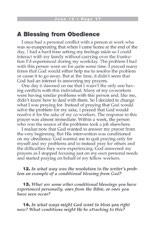
Teachers can provide adult students with The Quiet Hour, a devotional for personal use. This will keep God’s Word in adults’ hands and in their hearts. You equip adults to lead their family members in God’s Word, inside and outside of Sunday school.
A variety of other resources are also available to enhance adults’ church and home study.

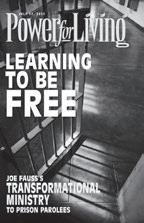
CROSS/Echoes curriculum guides students through a thorough study of the Bible.
Preschool children and early readers in kindergarten and first grade get a firm foundation before beginning in-depth Bible study. During elementary through high school years, students examine the entire Bible—cover to cover—almost four times, digging ever deeper every three years as their minds mature. CROSS/ Echoes adult Bible studies then sustain their lives of self-examination and service.
CROSS/Echoes provides excellent Bible coverage of passages that students can understand and practice. That’s why Bible study passages are chosen with students’ abilities in mind. For example, at the younger age levels, we do not talk in-depth about David and Bathsheba’s relationship. That’s only appropriate for older students. The result—students learn and apply Bible truth at their own age levels.
Your goal is results—to help students become “doers of the Word” (James 1:22, KJV). How? The Bible says “bring [children] up in the training and instruction of the Lord” (Eph. 6:4b.) That means teaching truths that they can understand and apply.
Hebrew words and examples in the Bible define stages of development from
infancy. Jesus was trained (Prov. 22:6a) at home and in the community by an extended family. And Jesus grew or increased in wisdom as He got older (Luke 2:52). He grew in His worship and in His ability to share the Holy Scriptures at the synagogue. He grew in His wisdom of dealing with others and in responding with wisdom as an adult servant. Each lesson helps students grow in godly wisdom.
CROSS/Echoes teachers can successfully build upon what students have already learned (see Deut. 6:2-9) so that students can grow in wisdom in relationship with God, with others, and in service. Excellence in Bible coverage, combined with all the right age-level materials, builds disciples. Plus, solid teacher-training materials give you all the right teaching tools to support your teaching ministry.
Experienced educators say that anyone can learn almost anything if the lesson is taught at the learner’s age level, and if the learner thinks the lesson is important to him or her. CROSS/Echoes materials—student books, Creative Teaching Aids; take-home books and papers, craft booklets—all work together at each age level to show students that their lessons are important to master and apply to their lives.
Teacher’s commentaries provide stepby-step instructions. This Superintendent’s Handbook pulls everything together for you.

Sunday School Superintendent Handbook is published quarterly by David C Cook, DavidCCook.org. © 2025 by David C Cook, 4050 Lee Vance Drive, Colorado Springs, CO 80918, U.S.A. Echoes® and David C Cook and its related logo are registered trademarks of David C Cook. All rights reserved. ISBN 978-2-125-95101-6 Printed in the United States of America. All Scripture quotations, unless otherwise indicated, are taken from the Holy Bible, New International Version®, NIV® Copyright © 1973, 1978, 1984, 2011 by Biblica, Inc.® Used by permission. All rights reserved worldwide. Scripture quotations marked (KJV) are taken from the King James Version. Lessons and/or Readings are based on the Uniform Series International Sunday School Lessons International Bible Lessons for Christian Teaching Copyright © 2021 National Council of the Churches of Christ in the USA. Used by permission. All rights reserved. Digital products are subject to the End User License Agreement (EULA) found at DavidCCook.org/EULA/ and any additional terms or restrictions that may accompany the product. Digital products cannot be returned, sold, or relicensed. This product license is good for 6 months. After 6 months, you must purchase another license. September - November 2025